
Creamos un asesor multidivisa sencillo utilizando MQL5 (Parte 6): Dos indicadores RSI se cruzan entre sí
Introducción
Entendemos por asesor multidivisa un asesor o un robot comercial que puede negociar (abrir/cerrar órdenes, gestionar órdenes como trailing stop loss y trailing profit) más de un par de símbolos desde un gráfico. En este artículo, el asesor comerciará con 30 pares.
Utilizaremos dos indicadores RSI con señales de cruce: cruce de RSI Rápido (Fast) y RSI Lento (Slow).
Como ya hemos demostrado en artículos anteriores, el trading multidivisa tanto en el terminal comercial como en el simulador de estrategias es posible gracias a MQL5.
El objetivo consiste en satisfacer las necesidades básicas de los tráders que desean robots comerciales eficaces. Confiando en las fortalezas y capacidades de MQL5, podemos crear un simple asesor multidivisa basado en las líneas de cruce del indicador RSI.
Particularidades
1. Pares comerciales.
El asesor comerciará con los siguientes pares:
Fórex:
EURUSD,GBPUSD,AUDUSD,NZDUSD,USDCAD,USDCHF,USDJPY,EURGBP, EURAUD, EURNZD, EURCAD, EURCHF, EURJPY, GBPAUD, GBPNZD, GBPCAD,
GBPCHF,GBPJPY,AUDNZD,AUDCAD,AUDCHF,AUDJPY,NZDCAD,NZDCHF,NZDJPY, CADCHF, CADJPY, CHFJPY = 28 pares
Más 2 pares de metales: XAUUSD (oro) y XAGUSD (plata)
Con esos, tendremos un total de 30 pares.
Para el asesor de este artículo, utilizaremos la función de procesamiento automático de nombres de símbolos con prefijos y/o sufijos, para que todo funcione sin problemas al utilizar el asesor con dichos símbolos.
Pero la función de detección de nombres de símbolos con prefijos y sufijos solo funcionará con nombres de pares de símbolos para divisas y metales en MetaTrader 5, no con símbolos e índices especiales.
Con respecto al asesor multidivisa del artículo anterior, algunos tráders preguntan cómo utilizar el asesor multidivisa como un asesor de divisa única o como un asesor independiente.
En el asesor del artículo anterior, existe una opción para utilizar el asesor comerciando con una sola divisa.
En el caso del asesor actual, seguiremos usando 10 pares para negociar. Uno de los 10 pares negociados es Trader's Desired Pairs, donde los pares negociados deben ser introducidos manualmente por el tráder en las propiedades del asesor. No olvide que el nombre del par introducido deberá figurar ya en la lista de 30 pares.
La opción Trader's Desired Pairs puede utilizarse para permitir a los asesores negociar solo con una divisa introduciendo solo un nombre de par deseado.
La configuración de los parámetros de entrada del asesor deberá establecerse como se muestra a continuación.

En el ejemplo anterior de parámetros de entrada, en el que el tráder solo introduce el nombre del par XAUUSD, el asesor solo negociará con él. Dondequiera que se encuentre el asesor, solo negociará con XAUUSD entre los 30 pares disponibles.
Además, en el asesor actual hemos añadido la posibilidad de elegir si negociar con una divisa o con varias.
Los parámetros de entrada del asesor deberán establecerse como se muestra en la siguiente figura.


En la variante de par único (SP), el asesor solo negociará con el par en el que esté colocado.
Por ejemplo, si el asesor se coloca en el par EURUSD, solo negociará con él.
Por lo tanto, los asesores de este artículo tienen dos formas de negociar una sola divisa o trabajar como un asesor independiente.
1. Usamos la opción MP, seleccionamos Trader's Desired Pairs, pero introducimos solo un nombre de par, por ejemplo XAUUSD.
En esta opción, no importará en qué par se coloque el asesor, solo negociará con el par introducido en Trader's Desired Pairs.
2. En el modo de selección de pares comerciales, seleccionamos SP.
Si colocamos el asesor en el par EURUSD, solo negociará con él.
Además, el grupo Trade on Specific Time (negociar en una hora específica) ofrece opciones a los tráders que desean negociar en una zona horaria concreta.
Probablemente muchos tráders quieren negociar según la zona horaria para que los pares comerciados se correspondan con la hora de la sesión comercial, por lo que en este asesor seguiremos utilizando la opción de sesión comercial (zona horaria).
2. Indicadores de señal.
El Índice de Fuerza Relativa ((Relative Strength Index, RSI) fue desarrollado por Welles Wilder y publicado en el libro "New Concepts in Technical Trading Systems" en 1978, y en la revista Commodities (ahora Modern Trader) de junio de 1978. El RSI se ha convertido en uno de los índices osciladores más populares;
Es un indicador técnico utilizado en el análisis de los mercados financieros, y diseñado para mostrar la fortaleza o la debilidad actual e histórica de una acción o mercado según los precios de cierre de un periodo comercial reciente.
RSI es un oscilador que sigue al precio y oscila entre 0 y 100. El propio Wilder recomendó usar un RSI de 14 periodos. Posteriormente, también se popularizaron los indicadores de 9 y 25 periodos.
El RSI se usa con mayor frecuencia en un periodo de 14 días y se mide en una escala de 0 a 100, con los máximos y mínimos marcados en 70 y 30 respectivamente. Se utilizan marcos temporales más cortos y más largos para previsiones alternativamente más cortas o más largas. Los máximos y mínimos (80 y 20 o 90 y 10) resultan menos comunes pero indican un impulso más intenso.
En el análisis técnico de MetaTrader 5 se especifica que la señal RSI se utiliza para los siguientes tipos de análisis:
- Picos y valles
- Modelos gráficos
- Swing fallido (ruptura de nivel de apoyo o resistencia)
- Niveles de apoyo y resistencia
- Divergencias
Por lo tanto, existen muchas variaciones de la estrategia comercial RSI.
Un analista e inversor escribió en su artículo:
"¿Qué configuración del RSI es mejor para el comercio intradía?
Desafortunadamente, el RSI funciona mejor con barras diarias. Hemos probado muchos datos intradía, pero sin demasiado éxito".
"¿Cómo negociar con RSI?
En primer lugar, preferimos usar barras diarias. En segundo lugar, preferimos utilizar un número corto de días en los ajustes, 5 días como máximo. En tercer lugar, el RSI funciona mejor con acciones que mantienen las posiciones por la noche. No hemos tenido éxito en Fórex".
Sin embargo, en este artículo utilizaremos las señales del cruce de RSI rápido y lento en Fórex.
Las pruebas demostrarán si esto es factible.
En las figuras 1 y 2, podemos ver el cruce de RSI rápido y lento.
Figura 1.
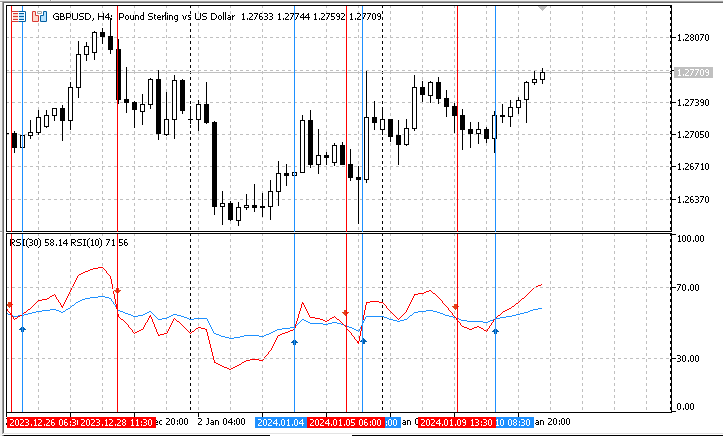
Figura 2
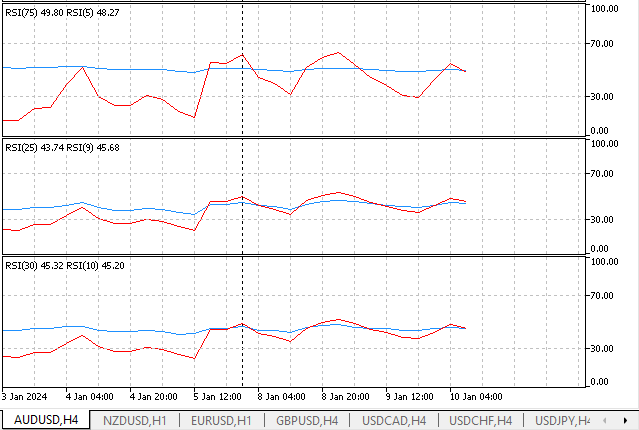
3. Control de transacciones y órdenes.
Existen varias formas de gestionar las operaciones con este asesor multidivisa:
3.1. Órdenes Stop Loss
Opciones: Use Order Stop Loss (Yes) o (No) - utilizar una orden Stop Loss: sí o no
- Si seleccionamos Use Order Stop Loss (No), todas las órdenes se abrirán sin un Stop Loss.
- Si seleccionamos Use Order Stop Loss (Yes), nuevamente aparecerá una opción: Use Automatic Calculation Stop Loss (Yes) o (No) - utilizar el Stop Loss calculado automáticamente: sí o no
- Si seleccionamos Automatic Calculation Stop Loss (Yes), el asesor calculará el Stop Loss.
- Si seleccionamos Automatic Calculation Stop Loss (No), el tráder deberá ingresar el valor del Stop Loss en pips.
- Si seleccionamos Use Order Stop Loss (No), el asesor verificará si se cumplen las condiciones de la señal. Si se cumplen, se guardará la orden. Si la señal se ha debilitado, la orden deberá cerrarse para conservar el beneficio, o bien la condición de la señal ha cambiado de dirección y la orden deberá cerrarse y la pérdida deberá fijarse.
- Si establecemos No, aunque la señal se haya debilitado, la orden se guardará o no se cerrará para preservar el beneficio.
- Con Yes, las condiciones para el RSI rápido y lento serán las siguientes:
Para cerrar órdenes de compra:
Cuando el RSI rápido está por encima del RSI lento y el valor del RSI rápido en la barra actual es menor que el valor del RSI rápido en la barra anterior, se cerrará la orden de compra.
Para cerrar órdenes de venta:
Cuando el RSI rápido esté por debajo del RSI lento y el valor del RSI rápido en la barra actual sea mayor que el valor del RSI rápido en la barra anterior, se cerrará la orden de venta.
El código para establecer una orden stop loss será el siguiente:
double MCEA::OrderSLSet(const string xsymb,ENUM_ORDER_TYPE type,double atprice) { //--- slv=0.0; int x=PairsIdxArray(xsymb); Pips(xsymb); RefreshTick(xsymb); //-- switch(type) { case (ORDER_TYPE_BUY): { if(use_sl==Yes && autosl==Yes) slv=mc_symbol.NormalizePrice(atprice-38*pip); else if(use_sl==Yes && autosl==No) slv=mc_symbol.NormalizePrice(atprice-SLval*pip); else slv=0.0; //-- break; } case (ORDER_TYPE_SELL): { if(use_sl==Yes && autosl==Yes) slv=mc_symbol.NormalizePrice(atprice+38*pip); else if(use_sl==Yes && autosl==No) slv=mc_symbol.NormalizePrice(atprice+SLval*pip); else slv=0.0; } } //--- return(slv); //--- } //-end OrderSLSet() //---------//
El código para cerrar una operación y conservar los beneficios debido a una señal débil será el siguiente:
int MCEA::GetCloseInWeakSignal(const string symbol,int exis) // Signal Indicator Position Close in profit { //--- int ret=0; int rise=1, down=-1; int bar=3; //-- double rdif=rsidiff; double RSIFast[], RSISlow[]; //-- ArrayResize(RSIFast,bar,bar); ArrayResize(RSISlow,bar,bar); ArraySetAsSeries(RSIFast,true); ArraySetAsSeries(RSISlow,true); //-- int x=PairsIdxArray(symbol); UpdatePrice(symbol,TFt); //-- CopyBuffer(hRSIFast[x],0,0,bar,RSIFast); CopyBuffer(hRSISlow[x],0,0,bar,RSISlow); //-- if(exis==down && RSIFast[1]<=RSISlow[1] && RSIFast[1]<RSIFast[2] && RSIFast[0]>RSIFast[1]+rdif) ret=rise; if(exis==rise && RSIFast[1]>=RSISlow[1] && RSIFast[1]>RSIFast[2] && RSIFast[0]<RSIFast[1]-rdif) ret=down; //-- return(ret); //--- } //-end GetCloseInWeakSignal() //---------//
2. Órdenes de Take Profit
Opciones: Use Order Take Profit (Yes) o (No) - usar órdenes de Take Profit: sí o no
- Si seleccionamos Use Order Take Profit (No), todas las órdenes se abrirán sin Take Profit.
- Si seleccionamos Use Order Take Profit (Yes), nuevamente aparecerá una opción: Use Automatic Calculation Order Take Profit (Yes) o (No) - utilizar el Take Profit calculado automáticamente: sí o no
- Si seleccionamos Automatic Calculation Order Take Profit (Yes), el asesor calculará el Take Profit.
- Si seleccionamos Automatic Calculation Order Take Profit (No), el tráder deberá ingresar el valor de Take Profit en pips.
Código para establecer un take profit:
double MCEA::OrderTPSet(const string xsymb,ENUM_ORDER_TYPE type,double atprice) { //--- tpv=0.0; int x=PairsIdxArray(xsymb); Pips(xsymb); RefreshTick(xsymb); //-- switch(type) { case (ORDER_TYPE_BUY): { if(use_tp==Yes && autotp==Yes) tpv=mc_symbol.NormalizePrice(atprice+50*pip); else if(use_tp==Yes && autotp==No) tpv=mc_symbol.NormalizePrice(atprice+TPval*pip); else tpv=0.0; //-- break; } case (ORDER_TYPE_SELL): { if(use_tp==Yes && autotp==Yes) tpv=mc_symbol.NormalizePrice(atprice-50*pip); else if(use_tp==Yes && autotp==No) tpv=mc_symbol.NormalizePrice(atprice-TPval*pip); else tpv=0.0; } } //--- return(tpv); //--- } //-end OrderTPSet() //---------//
3. Trailing stop y trailing take profit.
Opciones: Use Trailing SL/TP (Yes) o (No) - utilizar Traling Stop Loss/Take Profit: sí o no
- Si establecemos Use Trailing SL/TP option (No), el asesor no utilizará el Traling Stop Loss ni el Traling Take Profit.
- Al utilizar Trailing SL/TP (Yes), los tráders pueden elegir entre dos opciones:
1. Trailing de los precios.
El asesor implementará el trailing stop utilizando los movimientos del precio y el valor del parámetro de entrada, así como un trailing profit basado en el valor de la variable TPmin (valor mínimo del trailing profit).
2. Trailing del indicador.
El trailing stop será realizado por el asesor usando el indicador VIDYA y un trailing profit basado en el valor de la variable TPmin (el valor mínimo del trailing profit).
Nota: El asesor ejecutará simultáneamente el Trailing Take Profit y el Trailing Stop.
Según mis investigaciones y experimentos, el indicador VIDYA resulta ligeramente mejor para establecer trailing stops en comparación con Parabolic SAR o varias opciones de medias móviles.
En comparación con el indicador Parabolic SAR, el indicador VIDYA está más cerca del movimiento del precio, y en comparación con los indicadores AMA, DEMA y MA, el indicador VIDYA se encuentra aún más lejos del movimiento del precio.
Así que en este artículo, hemos decidido utilizar el indicador VIDYA para la función trailing stop basada en el indicador.
Código para la función de precio de trailing stop y el indicador:
double MCEA::TSPrice(const string xsymb,ENUM_POSITION_TYPE ptype,int TS_type) { //--- int br=2; double pval=0.0; int x=PairsIdxArray(xsymb); Pips(xsymb); //-- switch(TS_type) { case 0: { RefreshTick(xsymb); if(ptype==POSITION_TYPE_BUY) pval=mc_symbol.NormalizePrice(mc_symbol.Bid()-TSval*pip); if(ptype==POSITION_TYPE_SELL) pval=mc_symbol.NormalizePrice(mc_symbol.Ask()+TSval*pip); break; } case 1: { double VIDyAv[]; ArrayResize(VIDyAv,br,br); ArraySetAsSeries(VIDyAv,true); CopyBuffer(hVIDyAv[x],0,0,br,VIDyAv); RefreshPrice(xsymb,TFt,br); //-- if(ptype==POSITION_TYPE_BUY && (VIDyAv[0]<mc_symbol.NormalizePrice(mc_symbol.Bid()-TSval*pip))) pval=VIDyAv[0]; if(ptype==POSITION_TYPE_SELL && (VIDyAv[0]>mc_symbol.NormalizePrice(mc_symbol.Ask()+TSval*pip))) pval=VIDyAv[0]; break; } } //-- return(pval); //--- } //-end TSPrice() //---------//
Cambio del código de la función SL/TP:
bool MCEA::ModifySLTP(const string symbx,int TS_type) { //--- ResetLastError(); MqlTradeRequest req={}; MqlTradeResult res={}; MqlTradeCheckResult check={}; //-- int TRSP=(Close_by_Opps==No && TS_type==1) ? 0 : TS_type; bool modist=false; int x=PairsIdxArray(symbx); Pips(symbx); //-- int total=PositionsTotal(); //-- for(int i=total-1; i>=0; i--) { string symbol=PositionGetSymbol(i); if(symbol==symbx && mc_position.Magic()==magicEA) { ENUM_POSITION_TYPE opstype = mc_position.PositionType(); if(opstype==POSITION_TYPE_BUY) { RefreshTick(symbol); double price = mc_position.PriceCurrent(); double vtrsb = mc_symbol.NormalizePrice(TSPrice(symbx,opstype,TRSP)); double pos_open = mc_position.PriceOpen(); double pos_stop = mc_position.StopLoss(); double pos_profit = mc_position.Profit(); double pos_swap = mc_position.Swap(); double pos_comm = mc_position.Commission(); double netp=pos_profit+pos_swap+pos_comm; double modstart=mc_symbol.NormalizePrice(pos_open+TSmin*pip); double modminsl=mc_symbol.NormalizePrice(vtrsb+((TSmin-1.0)*pip)); double modbuysl=vtrsb; double modbuytp=mc_symbol.NormalizePrice(price+TPval*pip); bool modbuy = (price>modminsl && modbuysl>modstart && (pos_stop==0.0||modbuysl>pos_stop)); //-- if(modbuy && netp>minprofit) { modist=mc_trade.PositionModify(symbol,modbuysl,modbuytp); } } if(opstype==POSITION_TYPE_SELL) { RefreshTick(symbol); double price = mc_position.PriceCurrent(); double vtrss = mc_symbol.NormalizePrice(TSPrice(symbx,opstype,TRSP)); double pos_open = mc_position.PriceOpen(); double pos_stop = mc_position.StopLoss(); double pos_profit = mc_position.Profit(); double pos_swap = mc_position.Swap(); double pos_comm = mc_position.Commission(); double netp=pos_profit+pos_swap+pos_comm; double modstart=mc_symbol.NormalizePrice(pos_open-TSmin*pip); double modminsl=mc_symbol.NormalizePrice(vtrss-((TSmin+1.0)*pip)); double modselsl=vtrss; double modseltp=mc_symbol.NormalizePrice(price-TPval*pip); bool modsel = (price<modminsl && modselsl<modstart && (pos_stop==0.0||modselsl<pos_stop)); //-- if(modsel && netp>minprofit) { modist=mc_trade.PositionModify(symbol,modselsl,modseltp); } } } } //-- return(modist); //--- } //-end ModifySLTP() //---------//
4. Gestión manual de órdenes.
Hemos añadido a este asesor multidivisa varias pulsaciones de botones manuales para garantizar que los tráders puedan actuar de forma eficaz al ver funcionar el asesor.
4.1. Set SL / TP All Orders (establecer Stop Loss / Take Profit para todas las órdenes):
Este botón resulta útil si el tráder ha establecido Order Stop Loss en No y/o Use Order Take Profit en No, y luego quiere usar Stop Loss y Take Profit para todas las órdenes. Con un solo clic en el botón Set SL/TP All Orders, se modificarán todas las órdenes y se aplicará un stop loss y/o take profit.
4.2. Close All Orders (Cerrar todas las órdenes):
Si un tráder desea cerrar todas las órdenes, puede hacerlo con un solo clic en el botón Close All Orders.
4.3. Close All Orders Profit (cerrar todas las órdenes rentables):
Para cerrar todas las órdenes rentables, bastará con hacer clic en el botón Close All Orders Profit.
5. Gestión de órdenes y símbolos.
Una característica muy útil para los asesores multidivisa que trabajan con 30 pares desde un mismo gráfico sería disponer de una única barra de botones para que los tráders puedan cambiar de gráfico o de símbolo con un solo clic y ver la precisión de la señal del indicador cuando el asesor abra o cierre una orden.
Implementamos la planificación en un programa MQL5
1. Encabezado del programa y parámetros de entrada.
Inclusión de un archivo de encabezado en MQL5
//+------------------------------------------------------------------+ //| Include | //+------------------------------------------------------------------+ #include <Trade\Trade.mqh> #include <Trade\PositionInfo.mqh> #include <Trade\SymbolInfo.mqh> #include <Trade\AccountInfo.mqh> //-- CTrade mc_trade; CSymbolInfo mc_symbol; CPositionInfo mc_position; CAccountInfo mc_account; //---
Enumeración para el uso de la zona horaria
//-- enum tm_zone { Cus_Session, // Trading on Custom Session New_Zealand, // Trading on New Zealand Session Australia, // Trading on Autralia Sydney Session Asia_Tokyo, // Trading on Asia Tokyo Session Europe_London, // Trading on Europe London Session US_New_York // Trading on US New York Session }; //--
Enumeración para seleccionar las horas
//-- enum swhour { hr_00=0, // 00:00 hr_01=1, // 01:00 hr_02=2, // 02:00 hr_03=3, // 03:00 hr_04=4, // 04:00 hr_05=5, // 05:00 hr_06=6, // 06:00 hr_07=7, // 07:00 hr_08=8, // 08:00 hr_09=9, // 09:00 hr_10=10, // 10:00 hr_11=11, // 11:00 hr_12=12, // 12:00 hr_13=13, // 13:00 hr_14=14, // 14:00 hr_15=15, // 15:00 hr_16=16, // 16:00 hr_17=17, // 17:00 hr_18=18, // 18:00 hr_19=19, // 19:00 hr_20=20, // 20:00 hr_21=21, // 21:00 hr_22=22, // 22:00 hr_23=23 // 23:00 }; //--
Enumeración para seleccionar los minutos
//-- enum inmnt { mn_00=0, // Minute 0 mn_05=5, // Minute 5 mn_10=10, // Minute 10 mn_15=15, // Minute 15 mn_20=20, // Minute 20 mn_25=25, // Minute 25 mn_30=30, // Minute 30 mn_35=35, // Minute 35 mn_40=40, // Minute 40 mn_45=45, // Minute 45 mn_50=50, // Minute 50 mn_55=55 // Minute 55 }; //--
Lista para seleccionar 10 pares para comerciar
//-- enum PairsTrade { All30, // All Forex 30 Pairs TrdWi, // Trader Wishes Pairs Usds, // Forex USD Pairs Eurs, // Forex EUR Pairs Gbps, // Forex GBP Pairs Auds, // Forex AUD Pairs Nzds, // Forex NZD Pairs Cads, // Forex CDD Pairs Chfs, // Forex CHF Pairs Jpys // Forex JPY Pairs }; //--
La enumeración YN se usará para las opciones (Yes) o (No) en el parámetro del asesor.
//-- enum YN { No, Yes }; //--
Enumeración para usar el tamaño del lote en la gestión de capital
//-- enum mmt { FixedLot, // Fixed Lot Size DynamLot // Dynamic Lot Size }; //--
Enumeración para seleccionar el marco temporal que se usará en el cálculo de los indicadores de señales
//-- enum TFUSE { TFM5, // 00_PERIOD_M5 TFM15, // 01_PERIOD_M15 TFM30, // 02_PERIOD_M30 TFH1, // 03_PERIOD_H1 TFH2, // 04_PERIOD_H2 TFH3, // 05_PERIOD_H3 TFH4, // 06_PERIOD_H4 TFH6, // 07_PERIOD_H6 TFH8, // 08_PERIOD_H8 TFH12, // 09_PERIOD_H12 TFD1 // 10_PERIOD_D1 }; //--
En el listado de TFUSE, limitaremos el uso de cálculos temporales para asesores solo de TF-M5 a TF-D1.
Enumeración para seleccionar el tipo que se usará en el cálculo del trailing stop.
//-- enum TrType { byprice, // Trailing Stop by Price byindi // Trailing Stop by Indicator }; //--
Enumeración para seleccionar el tipo de transacción del asesor: monodivisa o multidivisa.
//-- enum MS { SP, // Single Pair MP // Multi Pairs }; //--
Parámetros de entrada del asesor
//--- input group "=== Global Strategy EA Parameter ==="; // Global Strategy EA Parameter input TFUSE tfinuse = TFH4; // Select Expert TimeFrame, default PERIOD_H4 input int rsifast = 10; // Input Period for Fast RSI input ENUM_APPLIED_PRICE frsiapp = PRICE_WEIGHTED; // Select Fast RSI Applied Price input int rsislow = 30; // Input Period for Slow RSI input ENUM_APPLIED_PRICE srsiapp = PRICE_WEIGHTED; // Select Slow RSI Applied Price input double rsidiff = 4.56; // Input Differentiation between RSIs //--- input group "=== Select Pairs to Trade ==="; // Selected Pairs to trading input MS trademode = MP; // Select Trading Pairs Mode (Multi or Single) input PairsTrade usepairs = All30; // Select Pairs to Use input string traderwishes = "eg. eurusd,usdchf"; // If Use Trader Wishes Pairs, input pair name here, separate by comma //-- input group "=== Money Management Lot Size Parameter ==="; // Money Management Lot Size Parameter input mmt mmlot = DynamLot; // Money Management Type input double Risk = 10.0; // Percent Equity Risk per Trade (Min=1.0% / Max=10.0%) input double Lots = 0.01; // Input Manual Lot Size FixedLot //--Trade on Specific Time input group "=== Trade on Specific Time ==="; // Trade on Specific Time input YN trd_time_zone = Yes; // Select If You Like to Trade on Specific Time Zone input tm_zone session = Cus_Session; // Select Trading Time Zone input swhour stsescuh = hr_00; // Time Hour to Start Trading Custom Session (0-23) input inmnt stsescum = mn_15; // Time Minute to Start Trading Custom Session (0-55) input swhour clsescuh = hr_23; // Time Hour to Stop Trading Custom Session (0-23) input inmnt clsescum = mn_55; // Time Minute to Stop Trading Custom Session (0-55) //--Day Trading On/Off input group "=== Day Trading On/Off ==="; // Day Trading On/Off input YN ttd0 = No; // Select Trading on Sunday (Yes) or (No) input YN ttd1 = Yes; // Select Trading on Monday (Yes) or (No) input YN ttd2 = Yes; // Select Trading on Tuesday (Yes) or (No) input YN ttd3 = Yes; // Select Trading on Wednesday (Yes) or (No) input YN ttd4 = Yes; // Select Trading on Thursday (Yes) or (No) input YN ttd5 = Yes; // Select Trading on Friday (Yes) or (No) input YN ttd6 = No; // Select Trading on Saturday (Yes) or (No) //--Trade & Order management Parameter input group "=== Trade & Order management Parameter ==="; // Trade & Order management Parameter input YN use_sl = No; // Use Order Stop Loss (Yes) or (No) input YN autosl = Yes; // Use Automatic Calculation Stop Loss (Yes) or (No) input double SLval = 30.0; // If Not Use Automatic SL - Input SL value in Pips input YN use_tp = Yes; // Use Order Take Profit (Yes) or (No) input YN autotp = Yes; // Use Automatic Calculation Take Profit (Yes) or (No) input double TPval = 60.0; // If Not Use Automatic TP - Input TP value in Pips input YN TrailingSLTP = Yes; // Use Trailing SL/TP (Yes) or (No) input TrType trlby = byindi; // Select Trailing Stop Type input double TSval = 10.0; // If Use Trailing Stop by Price Input value in Pips input double TSmin = 5.0; // Minimum Pips to start Trailing Stop input double TPmin = 25.0; // Input Trailing Profit Value in Pips input YN Close_by_Opps = Yes; // Close Trade By Opposite Signal (Yes) or (No) input YN SaveOnRev = Yes; // Close Trade and Save profit due to weak signal (Yes) or (No) //--Others Expert Advisor Parameter input group "=== Others Expert Advisor Parameter ==="; // Others EA Parameter input YN alerts = Yes; // Display Alerts / Messages (Yes) or (No) input YN UseEmailAlert = No; // Email Alert (Yes) or (No) input YN UseSendnotify = No; // Send Notification (Yes) or (No) input YN trade_info_display = Yes; // Select Display Trading Info on Chart (Yes) or (No) input ulong magicEA = 20240111; // Expert ID (Magic Number) //--- //---------//
Nota: Si dejamos el parámetro de entrada Expert ID (Magic Number) vacío, el asesor podrá gestionar las órdenes abiertas manualmente.
En el grupo de propiedades de entrada Global Strategy EA Parameters del asesor el tráder podrá elegir un marco temporal para calcular las señales del indicador e introducir los parámetros:
- Valor y precio aplicado del RSI rápido
- Valor y precio aplicado del RSI lento
- Valor de la diferenciación entre RSI rápido y lento
En el grupo de propiedades de los datos de entrada Select Pairs to Trade deberemos seleccionar un par para comerciar entre las 10 opciones proporcionadas. El valor por defecto será All Forex 30 Pairs.
Para configurar el par a comerciar, llamaremos a la función HandlingSymbolArrays(). Usando la función HandlingSymbolArrays(), manejaremos todos los pares comerciados.
void MCEA::HandlingSymbolArrays(void) { //--- string All30[]={"EURUSD","GBPUSD","AUDUSD","NZDUSD","USDCAD","USDCHF","USDJPY","EURGBP", "EURAUD","EURNZD","EURCAD","EURCHF","EURJPY","GBPAUD","GBPNZD","GBPCAD", "GBPCHF","GBPJPY","AUDNZD","AUDCAD","AUDCHF","AUDJPY","NZDCAD","NZDCHF", "NZDJPY","CADCHF","CADJPY","CHFJPY","XAUUSD","XAGUSD"}; // 30 pairs string USDs[]={"USDCAD","USDCHF","USDJPY","AUDUSD","EURUSD","GBPUSD","NZDUSD","XAUUSD","XAGUSD"}; // USD pairs string EURs[]={"EURAUD","EURCAD","EURCHF","EURGBP","EURJPY","EURNZD","EURUSD"}; // EUR pairs string GBPs[]={"GBPAUD","GBPCAD","GBPCHF","EURGBP","GBPJPY","GBPNZD","GBPUSD"}; // GBP pairs string AUDs[]={"AUDCAD","AUDCHF","EURAUD","GBPAUD","AUDJPY","AUDNZD","AUDUSD"}; // AUD pairs string NZDs[]={"AUDNZD","NZDCAD","NZDCHF","EURNZD","GBPNZD","NZDJPY","NZDUSD"}; // NZD pairs string CADs[]={"AUDCAD","CADCHF","EURCAD","GBPCAD","CADJPY","NZDCAD","USDCAD"}; // CAD pairs string CHFs[]={"AUDCHF","CADCHF","EURCHF","GBPCHF","NZDCHF","CHFJPY","USDCHF"}; // CHF pairs string JPYs[]={"AUDJPY","CADJPY","CHFJPY","EURJPY","GBPJPY","NZDJPY","USDJPY"}; // JPY pairs //-- sall=ArraySize(All30); arusd=ArraySize(USDs); areur=ArraySize(EURs); aretc=ArraySize(JPYs); ArrayResize(VSym,sall,sall); ArrayCopy(VSym,All30,0,0,WHOLE_ARRAY); //-- if(usepairs==TrdWi && StringFind(traderwishes,"eg.",0)<0) { string to_split=traderwishes; // A string to split into substrings pairs name string sep=","; // A separator as a character ushort u_sep; // The code of the separator character //--- Get the separator code u_sep=StringGetCharacter(sep,0); //--- Split the string to substrings int p=StringSplit(to_split,u_sep,SPC); if(p>0) { for(int i=0; i<p; i++) StringToUpper(SPC[i]); //-- for(int i=0; i<p; i++) { if(ValidatePairs(SPC[i])<0) ArrayRemove(SPC,i,1); } } arspc=ArraySize(SPC); } //-- SetSymbolNamePS(); // With this function we will detect whether the Symbol Name has a prefix and/or suffix //-- if(inpre>0 || insuf>0) { if(usepairs==TrdWi && arspc>0) { for(int t=0; t<arspc; t++) { SPC[t]=pre+SPC[t]+suf; } } //-- for(int t=0; t<sall; t++) { All30[t]=pre+All30[t]+suf; } for(int t=0; t<arusd; t++) { USDs[t]=pre+USDs[t]+suf; } for(int t=0; t<areur; t++) { EURs[t]=pre+EURs[t]+suf; } for(int t=0; t<aretc; t++) { GBPs[t]=pre+GBPs[t]+suf; } for(int t=0; t<aretc; t++) { AUDs[t]=pre+AUDs[t]+suf; } for(int t=0; t<aretc; t++) { NZDs[t]=pre+NZDs[t]+suf; } for(int t=0; t<aretc; t++) { CADs[t]=pre+CADs[t]+suf; } for(int t=0; t<aretc; t++) { CHFs[t]=pre+CHFs[t]+suf; } for(int t=0; t<aretc; t++) { JPYs[t]=pre+JPYs[t]+suf; } } //-- ArrayCopy(VSym,All30,0,0,WHOLE_ARRAY); ArrayResize(AS30,sall,sall); ArrayCopy(AS30,All30,0,0,WHOLE_ARRAY); for(int x=0; x<sall; x++) {SymbolSelect(AS30[x],true);} if(ValidatePairs(Symbol())>=0) symbfix=true; if(!symbfix) { Alert("Expert Advisors will not trade on pairs "+Symbol()); Alert("-- "+expname+" -- ",Symbol()," -- expert advisor will be Remove from the chart."); ExpertRemove(); } //-- switch(usepairs) { case 0: // All Forex & Metal 30 Pairs { ArrayResize(DIRI,sall,sall); arrsymbx=sall; ArraySymbolResize(); ArrayCopy(DIRI,All30,0,0,WHOLE_ARRAY); pairs="Multi Currency "+string(sall)+" Pairs"; //-- break; } case 1: // Trader wishes pairs { ArrayResize(DIRI,arspc,arspc); arrsymbx=arspc; ArraySymbolResize(); ArrayCopy(DIRI,SPC,0,0,WHOLE_ARRAY); pairs="("+string(arspc)+") Trader Wishes Pairs"; //-- break; } case 2: // USD pairs { ArrayResize(DIRI,arusd,arusd); arrsymbx=arusd; ArraySymbolResize(); ArrayCopy(DIRI,USDs,0,0,WHOLE_ARRAY); pairs="("+string(arusd)+") Multi Currency USD Pairs"; //-- break; } case 3: // EUR pairs { ArrayResize(DIRI,areur,areur); arrsymbx=aretc; ArraySymbolResize(); ArrayCopy(DIRI,EURs,0,0,WHOLE_ARRAY); pairs="("+string(aretc)+") Forex EUR Pairs"; //-- break; } case 4: // GBP pairs { ArrayResize(DIRI,aretc,aretc); arrsymbx=aretc; ArraySymbolResize(); ArrayCopy(DIRI,GBPs,0,0,WHOLE_ARRAY); pairs="("+string(aretc)+") Forex GBP Pairs"; //-- break; } case 5: // AUD pairs { ArrayResize(DIRI,aretc,aretc); arrsymbx=aretc; ArraySymbolResize(); ArrayCopy(DIRI,AUDs,0,0,WHOLE_ARRAY); pairs="("+string(aretc)+") Forex AUD Pairs"; //-- break; } case 6: // NZD pairs { ArrayResize(DIRI,aretc,aretc); arrsymbx=aretc; ArraySymbolResize(); ArrayCopy(DIRI,NZDs,0,0,WHOLE_ARRAY); pairs="("+string(aretc)+") Forex NZD Pairs"; //-- break; } case 7: // CAD pairs { ArrayResize(DIRI,aretc,aretc); arrsymbx=aretc; ArraySymbolResize(); ArrayCopy(DIRI,CADs,0,0,WHOLE_ARRAY); pairs="("+string(aretc)+") Forex CAD Pairs"; //-- break; } case 8: // CHF pairs { ArrayResize(DIRI,aretc,aretc); arrsymbx=aretc; ArraySymbolResize(); ArrayCopy(DIRI,CHFs,0,0,WHOLE_ARRAY); pairs="("+string(aretc)+") Forex CHF Pairs"; //-- break; } case 9: // JPY pairs { ArrayResize(DIRI,aretc,aretc); arrsymbx=aretc; ArraySymbolResize(); ArrayCopy(DIRI,JPYs,0,0,WHOLE_ARRAY); pairs="("+string(aretc)+") Forex JPY Pairs"; //-- break; } } //-- return; //--- } //-end HandlingSymbolArrays() //---------//
Dentro de la función HandlingSymbolArrays(), llamaremos a la función SetSymbolNamePS(). Usando SetSymbolNamePS(), podremos gestionar nombres de símbolos con prefijo y/o sufijo.
void MCEA::SetSymbolNamePS(void) { //--- int sym_Lenpre=0; int sym_Lensuf=0; string sym_pre=""; string sym_suf=""; SymbolSelect(Symbol(),true); string insymbol=Symbol(); int inlen=StringLen(insymbol); int toseek=-1; string dep=""; string bel=""; string sym_use =""; int pairx=-1; string xcur[]={"EUR","GBP","AUD","NZD","USD","CAD","CHF"}; // 7 major currency int xcar=ArraySize(xcur); //-- for(int x=0; x<xcar; x++) { toseek=StringFind(insymbol,xcur[x],0); if(toseek>=0) { pairx=x; break; } } if(pairx>=0) { int awl=toseek-3 <0 ? 0 : toseek-3; int sd=StringFind(insymbol,"SD",0); if(toseek==0 && sd<4) { dep=StringSubstr(insymbol,toseek,3); bel=StringSubstr(insymbol,toseek+3,3); sym_use=dep+bel; } else if(toseek>0) { dep=StringSubstr(insymbol,toseek,3); bel=StringSubstr(insymbol,toseek+3,3); sym_use=dep+bel; } else { dep=StringSubstr(insymbol,awl,3); bel=StringSubstr(insymbol,awl+3,3); sym_use=dep+bel; } } //-- string sym_nmx=sym_use; int lensx=StringLen(sym_nmx); //-- if(inlen>lensx && lensx==6) { sym_Lenpre=StringFind(insymbol,sym_nmx,0); sym_Lensuf=inlen-lensx-sym_Lenpre; //-- if(sym_Lenpre>0) { sym_pre=StringSubstr(insymbol,0,sym_Lenpre); for(int i=0; i<xcar; i++) if(StringFind(sym_pre,xcur[i],0)>=0) sym_pre=""; } if(sym_Lensuf>0) { sym_suf=StringSubstr(insymbol,sym_Lenpre+lensx,sym_Lensuf); for(int i=0; i<xcar; i++) if(StringFind(sym_suf,xcur[i],0)>=0) sym_suf=""; } } //-- pre=sym_pre; suf=sym_suf; inpre=StringLen(pre); insuf=StringLen(suf); posCur1=inpre; posCur2=posCur1+3; //-- return; //--- } //-end SetSymbolNamePS() //---------//
Nota: El asesor comprueba los pares. Si el tráder se ha equivocado al introducir el nombre del par o ha fallado la comprobación del par, el asesor emitirá una advertencia y se eliminará del gráfico.
En el grupo de propiedades Trade on Specific Time input, el tráder deberá seleccionar Trade on Specific Time Zone (Yes) o (No): comerciar en una zona horaria específica: sí o no.
Si la opción Trade on Specific Time Zone option es igual a No, el asesor comerciará de 00:15 a 23:59.
En caso afirmativo, deberemos seleccionar los parámetros de la enumeración:
- Trading on Custom Session (sesión personalizada)
- Trading on New Zealand Session (sesión de Nueva Zelanda)
- Trading on Australia Sydney Session (sesión de Sídney)
- Trading on Asia Tokyo Session (sesión de Tokio)
- Trading on Europe London Session (sesión de Londres)
- Trading on America New York Session (sesión de Nueva York)
Por defecto, Trading on Specific Time Zones es igual a Yes y está establecido en Trading on Custom Sessions.
Al seleccionar una sesión de usuario:
Los tráders deberán establecer una hora u horas y minutos para empezar a comerciar y unas horas y minutos para finalizar el comercio. Así, el asesor solo realizará acciones durante el tiempo especificado.
En otros casos, las horas de inicio y fin de la negociación las elige el asesor.
Clase para el funcionamiento del asesor
Para crear y configurar el flujo de trabajo de asesor, crearemos una clase que declarará todas las variables, objetos y funciones necesarias.
//+------------------------------------------------------------------+ //| Class for working Expert Advisor | //+------------------------------------------------------------------+ class MCEA { //--- private: //---- int x_year; // Year int x_mon; // Month int x_day; // Day of the month int x_hour; // Hour in a day int x_min; // Minutes int x_sec; // Seconds //-- int oBm, oSm, ldig; //--- Variables used in prefix and suffix symbols int posCur1, posCur2; int inpre, insuf; bool symbfix; string pre,suf; string prefix,suffix; //--- Variables are used in Trading Time Zone int ishour, onhour; int tftrlst, tfcinws; datetime rem, znop, zncl, zntm; datetime SesCuOp, SesCuCl, Ses01Op, Ses01Cl, Ses02Op, Ses02Cl, Ses03Op, Ses03Cl, Ses04Op, Ses04Cl, Ses05Op, Ses05Cl, SesNoOp, SesNoCl; //-- string tz_ses, tz_opn, tz_cls; //-- string tmopcu, tmclcu, tmop01, tmcl01, tmop02, tmcl02, tmop03, tmcl03, tmop04, tmcl04, tmop05, tmcl05, tmopno, tmclno; //---------------------- //-- double LotPS; double point; double slv, tpv, pip, xpip; double SARstep, SARmaxi; double floatprofit, fixclprofit; //-- string pairs, hariini, daytrade, trade_mode; //-- double OPEN[], HIGH[], LOW[], CLOSE[]; datetime TIME[]; datetime closetime; //-- //------------ //------------ void SetSymbolNamePS(void); void HandlingSymbolArrays(void); void Set_Time_Zone(void); void Time_Zone(void); bool Trade_session(void); string PosTimeZone(void); int ThisTime(const int reqmode); int ReqTime(datetime reqtime,const int reqmode); //-- int DirectionMove(const string symbol,const ENUM_TIMEFRAMES stf); int GetRSIxx(const string symbol); int PARSAR05(const string symbol); int PARSAR15(const string symbol); int LotDig(const string symbol); //-- bool CheckProfit(const string symbol,ENUM_POSITION_TYPE intype); bool CheckLoss(const string symbol,ENUM_POSITION_TYPE intype); //-- double MLots(const string symbx); double NonZeroDiv(double val1,double val2); double OrderSLSet(const string xsymb,ENUM_ORDER_TYPE type,double atprice); double OrderTPSet(const string xsymb,ENUM_ORDER_TYPE type,double atprice); double SetOrderSL(const string xsymb,ENUM_POSITION_TYPE type,double atprice); double SetOrderTP(const string xsymb,ENUM_POSITION_TYPE type,double atprice); double TSPrice(const string xsymb,ENUM_POSITION_TYPE ptype,int TS_type); //-- string ReqDate(int d,int h,int m); string TF2Str(ENUM_TIMEFRAMES period); string timehr(int hr,int mn); string TradingDay(void); string AccountMode(); string GetCommentForOrder(void) { return(expname); } //------------ public: //--- //-- RSIxRSI_MCEA Config -- string DIRI[], AS30[], VSym[]; string SPC[]; string USD[]; string EUR[]; string GBP[]; string AUD[]; string NZD[]; string CAD[]; string CHF[]; string JPY[]; //-- string expname; //-- int hRSIFast[], hRSISlow[]; int hVIDyAv[]; int hPar05[], hPar15[]; int ALO, dgts, arrsar, arrsymbx; int sall, arusd, areur, aretc, arspc, arper; ulong slip; //-- double profitb[], profits[]; double minprofit; //-- int Buy, Sell; int ccur, psec, xtto, checktml; int OpOr[],xob[],xos[]; //-- int year, // Year mon, // Month day, // Day hour, // Hour min, // Minutes sec, // Seconds dow, // Day of week (0-Sunday, 1-Monday, ... ,6-Saturday) doy; // Day number of the year (January 1st is assigned the number value of zero) //-- ENUM_TIMEFRAMES TFt, TFT05, TFT15; //-- bool PanelExtra; //------------ MCEA(void); ~MCEA(void); //------------ //-- virtual void RSIxRSI_MCEA_Config(void); virtual void ExpertActionTrade(void); //-- void ArraySymbolResize(void); void CurrentSymbolSet(const string symbol); void Pips(const string symbol); void TradeInfo(void); void Do_Alerts(const string symbx,string msgText); void CheckOpenPMx(const string symbx); void SetSLTPOrders(void); void CloseAllOrders(void); void CheckClose(const string symbx); void TodayOrders(void); void UpdatePrice(const string symbol,ENUM_TIMEFRAMES xtf); void RefreshPrice(const string symbx,ENUM_TIMEFRAMES xtf,int bars); //-- bool RefreshTick(const string symbx); bool TradingToday(void); bool OpenBuy(const string symbol); bool OpenSell(const string symbol); bool ModifyOrderSLTP(double mStop,double ordtp); bool ModifySLTP(const string symbx,int TS_type); bool CloseAllProfit(void); bool ManualCloseAllProfit(void); bool CheckProfitLoss(const string symbol); bool CloseBuyPositions(const string symbol); bool CloseSellPositions(const string symbol); //-- int PairsIdxArray(const string symbol); int ValidatePairs(const string symbol); int GetOpenPosition(const string symbol); int GetCloseInWeakSignal(const string symbol,int exis); //-- string getUninitReasonText(int reasonCode); //-- //------------ //--- }; //-end class MCEA //---------// MCEA mc; //---------//
La primera y más importante función en el flujo de trabajo del asesor multidivisa, llamada desde OnInit(), será RSIxRSI_MCEA_Config().
La función RSIxRSI_MCEA_Config() configurará todos los símbolos usados, todos los marcos temporales, todos los indicadores utilizados y algunas funciones importantes del encabezado del archivo include.
La función RSIxRSI_MCEA_Config() describirá e implementará los métodos de procesamiento de marcos temporales y creación de indicadores para todos los indicadores utilizados en el flujo de trabajo del asesor.
//+------------------------------------------------------------------+ //| Expert Configuration | //+------------------------------------------------------------------+ void MCEA::RSIxRSI_MCEA_Config(void) { //--- //-- HandlingSymbolArrays(); // With this function we will handle all pairs that will be traded //-- TFT05=PERIOD_M5; TFT15=PERIOD_M15; ENUM_TIMEFRAMES TFs[]={PERIOD_M5,PERIOD_M15,PERIOD_M30,PERIOD_H1,PERIOD_H2,PERIOD_H3,PERIOD_H4,PERIOD_H6,PERIOD_H8,PERIOD_H12,PERIOD_D1}; int arTFs=ArraySize(TFs); //-- for(int x=0; x<arTFs; x++) if(tfinuse==x) TFt=TFs[x]; // TF for calculation signal //-- //-- Indicators handle for all symbol for(int x=0; x<arrsymbx; x++) { hRSISlow[x]=iRSI(DIRI[x],TFt,rsislow,srsiapp); //-- Handle for the Slow RSI indicator hRSIFast[x]=iRSI(DIRI[x],TFt,rsifast,frsiapp); //-- Handle for the Fast RSI indicator hVIDyAv[x]=iVIDyA(DIRI[x],TFt,9,12,0,PRICE_WEIGHTED); //-- Handle for the VIDYA indicator for Trailing Stop hPar05[x]=iSAR(DIRI[x],TFT05,SARstep,SARmaxi); //-- Handle for the iSAR indicator for M5 Timeframe hPar15[x]=iSAR(DIRI[x],TFT15,SARstep,SARmaxi); //-- Handle for the iSAR indicator for M15 Timeframe //-- } //-- minprofit=NormalizeDouble(TSmin/100.0,2); //-- ALO=(int)mc_account.LimitOrders()>sall ? sall : (int)mc_account.LimitOrders(); if(Close_by_Opps==No) { if((int)mc_account.LimitOrders()>=(sall*2)) ALO=sall*2; else ALO=(int)(mc_account.LimitOrders()/2); } //-- LotPS=(double)ALO; //-- mc_trade.SetExpertMagicNumber(magicEA); mc_trade.SetDeviationInPoints(slip); mc_trade.SetMarginMode(); Set_Time_Zone(); //-- return; //--- } //-end RSIxRSI_MCEA_Config() //---------//
2. Función Expert Tick
En la función Expert Tick (OnTick()) llamaremos a una de las funciones principales del asesor multidivisa, concretamente a la función ExpertActionTrade(). Esta función incluirá el proceso completo del asesor.
//+------------------------------------------------------------------+ //| Expert tick function | //+------------------------------------------------------------------+ void OnTick(void) { //--- mc.ExpertActionTrade(); //-- return; //--- } //-end OnTick() //---------//
Y esto significa que la función ExpertActionTrade() realizará todas las acciones y gestionará las transacciones automáticas, incluidas las órdenes de apertura/cierre, trailing stop, trailing take profit y otras acciones adicionales.
void MCEA::ExpertActionTrade(void) { //--- //--Check Trading Terminal ResetLastError(); //-- if(!MQLInfoInteger(MQL_TRADE_ALLOWED) && mc.checktml==0) //-- Check whether MT5 Algorithmic trading is Allow or Prohibit { mc.Do_Alerts(Symbol(),"Trading Expert at "+Symbol()+" are NOT Allowed by Setting."); mc.checktml=1; //-- Variable checktml is given a value of 1, so that the alert is only done once. return; } //-- if(!DisplayManualButton("M","C","R")) DisplayManualButton(); //-- Show the expert manual button panel //-- if(trade_info_display==Yes) mc.TradeInfo(); //-- Displayed Trading Info on Chart //--- //-- int mcsec=mc.ThisTime(mc.sec); //-- if(fmod((double)mcsec,5.0)==0) mc.ccur=mcsec; //-- if(mc.ccur!=mc.psec) { string symbol; //-- Here we start with the rotation of the name of all symbol or pairs to be traded for(int x=0; x<mc.arrsymbx && !IsStopped(); x++) { //-- switch(trademode) { case SP: { if(mc.DIRI[x]!=Symbol()) continue; symbol=Symbol(); mc.pairs=mc.pairs+" ("+symbol+")"; break; } case MP: { if(mc.DIRI[x]==Symbol()) symbol=Symbol(); else symbol=mc.DIRI[x]; break; } } //-- mc.CurrentSymbolSet(symbol); //-- if(mc.TradingToday() && mc.Trade_session()) { //-- mc.OpOr[x]=mc.GetOpenPosition(symbol); //-- Get trading signals to open positions //-- //-- and store in the variable OpOr[x] if(mc.OpOr[x]==mc.Buy) //-- If variable OpOr[x] get result of GetOpenPosition(symbol) as "Buy" (value=1) { //-- mc.CheckOpenPMx(symbol); //-- if(Close_by_Opps==Yes && mc.xos[x]>0) mc.CloseSellPositions(symbol); //-- if(mc.xob[x]==0 && mc.xtto<mc.ALO) mc.OpenBuy(symbol); else if(mc.xtto>=mc.ALO) { //-- mc.Do_Alerts(symbol,"Maximum amount of open positions and active pending orders has reached"+ "\n the limit = "+string(mc.ALO)+" Orders "); //-- mc.CheckOpenPMx(symbol); //-- if(mc.xos[x]>0 && mc.profits[x]<-1.02 && mc.xob[x]==0) {mc.CloseSellPositions(symbol); mc.OpenBuy(symbol);} else if(SaveOnRev==Yes) mc.CloseAllProfit(); } } if(mc.OpOr[x]==mc.Sell) //-- If variable OpOr[x] get result of GetOpenPosition(symbol) as "Sell" (value=-1) { //-- mc.CheckOpenPMx(symbol); //-- if(Close_by_Opps==Yes && mc.xob[x]>0) mc.CloseBuyPositions(symbol); //-- if(mc.xos[x]==0 && mc.xtto<mc.ALO) mc.OpenSell(symbol); else if(mc.xtto>=mc.ALO) { //-- mc.Do_Alerts(symbol,"Maximum amount of open positions and active pending orders has reached"+ "\n the limit = "+string(mc.ALO)+" Orders "); //-- mc.CheckOpenPMx(symbol); //-- if(mc.xob[x]>0 && mc.profitb[x]<-1.02 && mc.xos[x]==0) {mc.CloseBuyPositions(symbol); mc.OpenSell(symbol);} else if(SaveOnRev==Yes) mc.CloseAllProfit(); } } } //-- mc.CheckOpenPMx(symbol); //-- if(mc.xtto>0) { //-- if(SaveOnRev==Yes) //-- Close Trade and Save profit due to weak signal (Yes) { mc.CheckOpenPMx(symbol); if(mc.profitb[x]>mc.minprofit && mc.xob[x]>0 && mc.GetCloseInWeakSignal(symbol,mc.Buy)==mc.Sell) { mc.CloseBuyPositions(symbol); mc.Do_Alerts(symbol,"Close BUY order "+symbol+" to save profit due to weak signal."); } if(mc.profits[x]>mc.minprofit && mc.xos[x]>0 && mc.GetCloseInWeakSignal(symbol,mc.Sell)==mc.Buy) { mc.CloseSellPositions(symbol); mc.Do_Alerts(symbol,"Close SELL order "+symbol+" to save profit due to weak signal."); } } //-- if(TrailingSLTP==Yes) //-- Use Trailing SL/TP (Yes) { mc.ModifySLTP(symbol,trlby); } } //-- mc.CheckOpenPMx(symbol); if(Close_by_Opps==No && (mc.xob[x]+mc.xos[x]>1)) { mc.CheckProfitLoss(symbol); mc.Do_Alerts(symbol,"Close order due stop in loss."); } //-- mc.CheckClose(symbol); } //-- mc.psec=mc.ccur; } //-- return; //--- } //-end ExpertActionTrade() //---------//
Por su parte, el grupo de propiedades Day Trading On/Off permitirá a los tráders comerciar en días concretos de domingo a sábado. Esto permitirá a los tráders activar o desactivar los asesores en un día concreto utilizando las opciones Yes o No.
//--Day Trading On/Off input group "=== Day Trading On/Off ==="; // Day Trading On/Off input YN ttd0 = No; // Select Trading on Sunday (Yes) or (No) input YN ttd1 = Yes; // Select Trading on Monday (Yes) or (No) input YN ttd2 = Yes; // Select Trading on Tuesday (Yes) or (No) input YN ttd3 = Yes; // Select Trading on Wednesday (Yes) or (No) input YN ttd4 = Yes; // Select Trading on Thursday (Yes) or (No) input YN ttd5 = Yes; // Select Trading on Friday (Yes) or (No) input YN ttd6 = No; // Select Trading on Saturday (Yes) or (No)
El orden de ejecución de Day Trading On/Off será el siguiente:
bool MCEA::TradingToday(void) { //--- bool tradetoday=false; int trdday=ThisTime(dow); hariini="No"; //-- int ttd[]; ArrayResize(ttd,7); ttd[0]=ttd0; ttd[1]=ttd1; ttd[2]=ttd2; ttd[3]=ttd3; ttd[4]=ttd4; ttd[5]=ttd5; ttd[6]=ttd6; //-- if(ttd[trdday]==Yes) {tradetoday=true; hariini="Yes";} //-- return(tradetoday); //--- } //-end TradingToday() //---------//
Nota: Las condiciones de Day Trading On/Off se mostrarán en la información comercial del gráfico.
Este será el trabajo de la función TradingDay()
string MCEA::TradingDay(void) { //--- int trdday=ThisTime(dow); switch(trdday) { case 0: daytrade="Sunday"; break; case 1: daytrade="Monday"; break; case 2: daytrade="Tuesday"; break; case 3: daytrade="Wednesday"; break; case 4: daytrade="Thursday"; break; case 5: daytrade="Friday"; break; case 6: daytrade="Saturday"; break; } return(daytrade); //--- } //-end TradingDay() //---------//
Los tráders tienen la posibilidad de comerciar según la zona horaria en el grupo de propiedades del asesor Trade at Specific Time.
Nota: En otros casos, las horas de inicio y fin de la negociación las elegirá el asesor.
Así, en las propiedades Expert Entry, los tráders solo deberán establecer la hora y el minuto de inicio del comercio, y la hora y el minuto de finalización del comercio para la sesión personalizada.
Lemos ampliado la función ExpertActionTrade() llamando a la función booleana Trade_session() específicamente para comerciar en zonas horarias.
Cuando Trade_session() sea true, el asesor trabajará hasta su finalización, y cuando sea false, el asesor solo realizará las tareas Close Trade and Save profit due to weak signal (Yes) (cerrar la transacción por señal débil (Sí)) y Trailing stop (Yes) (trailing stop (Sí)).
bool MCEA::Trade_session(void) { //--- bool trd_ses=false; ishour=ThisTime(hour); if(ishour!=onhour) Set_Time_Zone(); datetime tcurr=TimeCurrent(); // Server Time //-- switch(session) { case Cus_Session: { if(tcurr>=SesCuOp && tcurr<=SesCuCl) trd_ses=true; break; } case New_Zealand: { if(tcurr>=Ses01Op && tcurr<=Ses01Cl) trd_ses=true; break; } case Australia: { if(tcurr>=Ses02Op && tcurr<=Ses02Cl) trd_ses=true; break; } case Asia_Tokyo: { if(tcurr>=Ses03Op && tcurr<=Ses03Cl) trd_ses=true; break; } case Europe_London: { if(tcurr>=Ses04Op && tcurr<=Ses04Cl) trd_ses=true; break; } case US_New_York: { if(tcurr>=Ses05Op && tcurr<=Ses05Cl) trd_ses=true; break; } } //-- if(trd_time_zone==No) { if(tcurr>=SesNoOp && tcurr<=SesNoCl) trd_ses=true; } //-- onhour=ishour; //-- return(trd_ses); //--- } //-end Trade_session() //---------//
El proceso de comerciar a una hora determinada es el siguiente: primero ExpertActionTrade() llama a Trade_session(), luego Trade_session() llama a Set_Time_Zone() y finalmente Set_Time_Zone() llama a Time_Zone().
void MCEA::Set_Time_Zone(void) { //--- //-- Server Time==TimeCurrent() datetime TTS=TimeTradeServer(); datetime GMT=TimeGMT(); //-- MqlDateTime svrtm,gmttm; TimeToStruct(TTS,svrtm); TimeToStruct(GMT,gmttm); int svrhr=svrtm.hour; // Server time hour int gmthr=gmttm.hour; // GMT time hour int difhr=svrhr-gmthr; // Time difference Server time to GMT time //-- int NZSGMT=12; // New Zealand Session GMT/UTC+12 int AUSGMT=10; // Australia Sydney Session GMT/UTC+10 int TOKGMT=9; // Asia Tokyo Session GMT/UTC+9 int EURGMT=0; // Europe London Session GMT/UTC 0 int USNGMT=-5; // US New York Session GMT/UTC-5 //-- int NZSStm=8; // New Zealand Session time start: 08:00 Local Time int NZSCtm=17; // New Zealand Session time close: 17:00 Local Time int AUSStm=7; // Australia Sydney Session time start: 07:00 Local Time int AUSCtm=17; // Australia Sydney Session time close: 17:00 Local Time int TOKStm=9; // Asia Tokyo Session time start: 09:00 Local Time int TOKCtm=18; // Asia Tokyo Session time close: 18:00 Local Time int EURStm=9; // Europe London Session time start: 09:00 Local Time int EURCtm=19; // Europe London Session time close: 19:00 Local Time int USNStm=8; // US New York Session time start: 08:00 Local Time int USNCtm=17; // US New York Session time close: 17:00 Local Time //-- int nzo = (NZSStm+difhr-NZSGMT)<0 ? 24+(NZSStm+difhr-NZSGMT) : (NZSStm+difhr-NZSGMT); int nzc = (NZSCtm+difhr-NZSGMT)<0 ? 24+(NZSCtm+difhr-NZSGMT) : (NZSCtm+difhr-NZSGMT); //-- int auo = (AUSStm+difhr-AUSGMT)<0 ? 24+(AUSStm+difhr-AUSGMT) : (AUSStm+difhr-AUSGMT); int auc = (AUSCtm+difhr-AUSGMT)<0 ? 24+(AUSCtm+difhr-AUSGMT) : (AUSCtm+difhr-AUSGMT); //-- int tko = (TOKStm+difhr-TOKGMT)<0 ? 24+(TOKStm+difhr-TOKGMT) : (TOKStm+difhr-TOKGMT); int tkc = (TOKCtm+difhr-TOKGMT)<0 ? 24+(TOKCtm+difhr-TOKGMT) : (TOKCtm+difhr-TOKGMT); //-- int euo = (EURStm+difhr-EURGMT)<0 ? 24+(EURStm+difhr-EURGMT) : (EURStm+difhr-EURGMT); int euc = (EURCtm+difhr-EURGMT)<0 ? 24+(EURCtm+difhr-EURGMT) : (EURCtm+difhr-EURGMT); //-- int uso = (USNStm+difhr-USNGMT)<0 ? 24+(USNStm+difhr-USNGMT) : (USNStm+difhr-USNGMT); int usc = (USNCtm+difhr-USNGMT)<0 ? 24+(USNCtm+difhr-USNGMT) : (USNCtm+difhr-USNGMT); if(usc==0||usc==24) usc=23; //-- //---Trading on Custom Session int _days00=ThisTime(day); int _days10=ThisTime(day); if(stsescuh>clsescuh) _days10=ThisTime(day)+1; tmopcu=ReqDate(_days00,stsescuh,stsescum); tmclcu=ReqDate(_days10,clsescuh,clsescum); //-- //--Trading on New Zealand Session GMT/UTC+12 int _days01=ThisTime(hour)<nzc ? ThisTime(day)-1 : ThisTime(day); int _days11=ThisTime(hour)<nzc ? ThisTime(day) : ThisTime(day)+1; tmop01=ReqDate(_days01,nzo,0); // start: 08:00 Local Time == 20:00 GMT/UTC tmcl01=ReqDate(_days11,nzc-1,59); // close: 17:00 Local Time == 05:00 GMT/UTC //-- //--Trading on Australia Sydney Session GMT/UTC+10 int _days02=ThisTime(hour)<auc ? ThisTime(day)-1 : ThisTime(day); int _days12=ThisTime(hour)<auc ? ThisTime(day) : ThisTime(day)+1; tmop02=ReqDate(_days02,auo,0); // start: 07:00 Local Time == 21:00 GMT/UTC tmcl02=ReqDate(_days12,auc-1,59); // close: 17:00 Local Time == 07:00 GMT/UTC //-- //--Trading on Asia Tokyo Session GMT/UTC+9 int _days03=ThisTime(hour)<tkc ? ThisTime(day) : ThisTime(day)+1; int _days13=ThisTime(hour)<tkc ? ThisTime(day) : ThisTime(day)+1; tmop03=ReqDate(_days03,tko,0); // start: 09:00 Local Time == 00:00 GMT/UTC tmcl03=ReqDate(_days13,tkc-1,59); // close: 18:00 Local Time == 09:00 GMT/UTC //-- //--Trading on Europe London Session GMT/UTC 00:00 int _days04=ThisTime(hour)<euc ? ThisTime(day) : ThisTime(day)+1; int _days14=ThisTime(hour)<euc ? ThisTime(day) : ThisTime(day)+1; tmop04=ReqDate(_days04,euo,0); // start: 09:00 Local Time == 09:00 GMT/UTC tmcl04=ReqDate(_days14,euc-1,59); // close: 19:00 Local Time == 19:00 GMT/UTC //-- //--Trading on US New York Session GMT/UTC-5 int _days05=ThisTime(hour)<usc ? ThisTime(day) : ThisTime(day)+1; int _days15=ThisTime(hour)<=usc ? ThisTime(day) : ThisTime(day)+1; tmop05=ReqDate(_days05,uso,0); // start: 08:00 Local Time == 13:00 GMT/UTC tmcl05=ReqDate(_days15,usc,59); // close: 17:00 Local Time == 22:00 GMT/UTC //-- //--Not Use Trading Time Zone if(trd_time_zone==No) { tmopno=ReqDate(ThisTime(day),0,15); tmclno=ReqDate(ThisTime(day),23,59); } //-- Time_Zone(); //-- return; //--- } //-end Set_Time_Zone() //---------//
void MCEA::Time_Zone(void) { //--- //-- tz_ses=""; //-- switch(session) { case Cus_Session: { SesCuOp=StringToTime(tmopcu); SesCuCl=StringToTime(tmclcu); zntm=SesCuOp; znop=SesCuOp; zncl=SesCuCl; tz_ses="Custom_Session"; tz_opn=timehr(stsescuh,stsescum); tz_cls=timehr(clsescuh,clsescum); break; } case New_Zealand: { Ses01Op=StringToTime(tmop01); Ses01Cl=StringToTime(tmcl01); zntm=Ses01Op; znop=Ses01Op; zncl=Ses01Cl; tz_ses="New_Zealand/Oceania"; tz_opn=timehr(ReqTime(Ses01Op,hour),ReqTime(Ses01Op,min)); tz_cls=timehr(ReqTime(Ses01Cl,hour),ReqTime(Ses01Cl,min)); break; } case Australia: { Ses02Op=StringToTime(tmop02); Ses02Cl=StringToTime(tmcl02); zntm=Ses02Op; znop=Ses02Op; zncl=Ses02Cl; tz_ses="Australia Sydney"; tz_opn=timehr(ReqTime(Ses02Op,hour),ReqTime(Ses02Op,min)); tz_cls=timehr(ReqTime(Ses02Cl,hour),ReqTime(Ses02Cl,min)); break; } case Asia_Tokyo: { Ses03Op=StringToTime(tmop03); Ses03Cl=StringToTime(tmcl03); zntm=Ses03Op; znop=Ses03Op; zncl=Ses03Cl; tz_ses="Asia/Tokyo"; tz_opn=timehr(ReqTime(Ses03Op,hour),ReqTime(Ses03Op,min)); tz_cls=timehr(ReqTime(Ses03Cl,hour),ReqTime(Ses03Cl,min)); break; } case Europe_London: { Ses04Op=StringToTime(tmop04); Ses04Cl=StringToTime(tmcl04); zntm=Ses04Op; znop=Ses04Op; zncl=Ses04Cl; tz_ses="Europe/London"; tz_opn=timehr(ReqTime(Ses04Op,hour),ReqTime(Ses04Op,min)); tz_cls=timehr(ReqTime(Ses04Cl,hour),ReqTime(Ses04Cl,min)); break; } case US_New_York: { Ses05Op=StringToTime(tmop05); Ses05Cl=StringToTime(tmcl05); zntm=Ses05Op; znop=Ses05Op; zncl=Ses05Cl; tz_ses="US/New_York"; tz_opn=timehr(ReqTime(Ses05Op,hour),ReqTime(Ses05Op,min)); tz_cls=timehr(ReqTime(Ses05Cl,hour),ReqTime(Ses05Cl,min)); break; } } //-- if(trd_time_zone==No) { SesNoOp=StringToTime(tmopno); SesNoCl=StringToTime(tmclno); zntm=SesNoOp; znop=SesNoOp; zncl=SesNoCl; tz_ses="Not Use Time Zone"; tz_opn=timehr(ReqTime(SesNoOp,hour),ReqTime(SesNoOp,min)); tz_cls=timehr(ReqTime(SesNoCl,hour),ReqTime(SesNoCl,min)); } //-- return; //--- } //-end Time_Zone() //---------//
3. Obtención de señales comerciales para abrir/cerrar una posición
Para obtener una señal para abrir una posición, la función ExpertActionTrade() llamará a la función GetOpenPosition().
int MCEA::GetOpenPosition(const string symbol) // Signal Open Position { //--- int ret=0; int rise=1, down=-1; //-- int rsix=GetRSIxx(symbol); int par15=PARSAR15(symbol); //-- if(rsix==rise && par15==rise) ret=rise; if(rsix==down && par15==down) ret=down; //-- return(ret); //--- } //-end GetOpenPosition() //---------//
La función GetOpenPosition() llamará a dos funciones:
- La función GetRSIxx(), que toma el valor del búfer de dos RSIs y calcula el algoritmo de la señal.
- La función PARSAR15() actúa como un filtro.
int MCEA::GetRSIxx(const string symbol) // Signal Open Position { //--- int ret=0; int rise=1, down=-1; int bar=3; //-- double rdif=rsidiff; double RSIFast[], RSISlow[]; //-- ArrayResize(RSIFast,bar,bar); ArrayResize(RSISlow,bar,bar); ArraySetAsSeries(RSIFast,true); ArraySetAsSeries(RSISlow,true); //-- int x=PairsIdxArray(symbol); UpdatePrice(symbol,TFt); //-- CopyBuffer(hRSIFast[x],0,0,bar,RSIFast); CopyBuffer(hRSISlow[x],0,0,bar,RSISlow); //-- if(RSIFast[1]<=RSISlow[1] && RSIFast[0]>RSISlow[0]+rdif) ret=rise; if(RSIFast[1]>=RSISlow[1] && RSIFast[0]<RSISlow[0]-rdif) ret=down; //-- return(ret); //--- } //-end GetRSIxx() //---------//
int MCEA::PARSAR15(const string symbol) // formula Parabolic SAR M5 { //--- int ret=0; int rise=1, down=-1; int br=2; //-- double PSAR[]; ArrayResize(PSAR,br,br); ArraySetAsSeries(PSAR,true); int xx=PairsIdxArray(symbol); CopyBuffer(hPar15[xx],0,0,br,PSAR); //-- RefreshPrice(symbol,TFT15,br); double HIG0=iHigh(symbol,TFT15,0); double LOW0=iLow(symbol,TFT15,0); //-- if(PSAR[0]<LOW0) ret=rise; if(PSAR[0]>HIG0) ret=down; //-- return(ret); //--- } //-end PARSAR15() //---------//
Dentro de las funciones GetRSIxx() y PARSAR15(), utilizaremos y llamaremos a una función, PairsIdxArray().
int xx=PairsIdxArray(symbol); int MCEA::PairsIdxArray(const string symbol) { //--- int pidx=-1; //-- for(int x=0; x<arrsymbx; x++) { if(DIRI[x]==symbol) { pidx=x; break; } } //-- return(pidx); //--- } //-end PairsIdxArray() //---------//
La función PairsIdxArray() se usará para obtener el nombre del símbolo y los indicadores solicitados. A continuación, se llamará al manejador del indicador correspondiente para obtener el valor del búfer del indicador RSI PSAR de ese símbolo y marco temporal.
En este asesor utilizaremos dos indicadores RSI.
Tendrán diferentes parámetros de entrada:
RSI rápido:
- symbol = según el símbolo solicitado,
- timeframe = como se especifica en el timeframe del asesor.
- ma_period = 10, según el periodo de entrada para RSI rápido
- applied_price = PRICE_WEIGHTED según el precio RSI rápido aplicado
RSI lento:
- symbol = según el símbolo solicitado,
- timeframe = como se especifica en el timeframe del asesor.
- ma_period = 30, según el periodo de entrada para el RSI lento
- applied_price = PRICE_WEIGHTED según el precio aplicado del RSI lento
//-- Indicators handle for all symbol for(int x=0; x<arrsymbx; x++) { hRSISlow[x]=iRSI(DIRI[x],TFt,rsislow,srsiapp); //-- Handle for the Slow RSI indicator hRSIFast[x]=iRSI(DIRI[x],TFt,rsifast,frsiapp); //-- Handle for the Fast RSI indicator hVIDyAv[x]=iVIDyA(DIRI[x],TFt,9,12,0,PRICE_WEIGHTED); //-- Handle for the VIDYA indicator for Trailing Stop hPar05[x]=iSAR(DIRI[x],TFT05,SARstep,SARmaxi); //-- Handle for the iSAR indicator for M5 Timeframe //-- }
Así, para obtener el valor del búfer para cada indicador RSI, copiaremos cada búfer del manejador del indicador.
Para copiar el búfer RSI rápido (búfer 0) desde el manejador RSI rápido al array objetivo:
CopyBuffer(hRSIFast[x],0,0,bar,RSIFast);
Para copiar el búfer RSI lento (búfer 0) desde el manejador RSI lento al array objetivo:
CopyBuffer(hRSISlow[x],0,0,bar,RSISlow);
Una vez ejecutadas las dos funciones GetRSIxx() y PARSAR05(), la función GetOpenPosition() ofrecerá los valores:
- Valor 0 - señal desconocida.
- Valor 1 - señal de compra.
- Valor -1 - señal de venta.
Cuando la función GetOpenPosition() retorna 1, el asesor llamará a la función OpenBuy() para abrir una orden de compra.
bool MCEA::OpenBuy(const string symbol) { //--- ResetLastError(); //-- bool buyopen = false; string ldComm = GetCommentForOrder()+"_Buy"; double ldLot = MLots(symbol); ENUM_ORDER_TYPE type_req = ORDER_TYPE_BUY; //-- MqlTradeRequest req={}; MqlTradeResult res={}; MqlTradeCheckResult check={}; //-- structure is set to zero ZeroMemory(req); ZeroMemory(res); ZeroMemory(check); //-- CurrentSymbolSet(symbol); double SL=OrderSLSet(symbol,type_req,mc_symbol.Bid()); double TP=OrderTPSet(symbol,type_req,mc_symbol.Ask()); //-- if(RefreshTick(symbol)) buyopen=mc_trade.Buy(ldLot,symbol,mc_symbol.Ask(),SL,TP,ldComm); //-- int error=GetLastError(); if(buyopen||error==0) { string bsopen="Open BUY Order for "+symbol+" ~ Ticket= ["+(string)mc_trade.ResultOrder()+"] successfully..!"; Do_Alerts(symbol,bsopen); } else { mc_trade.CheckResult(check); Do_Alerts(Symbol(),"Open BUY order for "+symbol+" FAILED!!. Return code= "+ (string)mc_trade.ResultRetcode()+". Code description: ["+mc_trade.ResultRetcodeDescription()+"]"); return(false); } //-- return(buyopen); //-- //--- } //-end OpenBuy //---------//
Si la función GetOpenPosition() retorna -1, el asesor llamará a la función OpenSell() para abrir una orden de Venta.
bool MCEA::OpenSell(const string symbol) { //--- ResetLastError(); //-- bool selopen = false; string sdComm = GetCommentForOrder()+"_Sell"; double sdLot = MLots(symbol); ENUM_ORDER_TYPE type_req = ORDER_TYPE_SELL; //-- MqlTradeRequest req={}; MqlTradeResult res={}; MqlTradeCheckResult check={}; //-- structure is set to zero ZeroMemory(req); ZeroMemory(res); ZeroMemory(check); //-- CurrentSymbolSet(symbol); double SL=OrderSLSet(symbol,type_req,mc_symbol.Ask()); double TP=OrderTPSet(symbol,type_req,mc_symbol.Bid()); //-- if(RefreshTick(symbol)) selopen=mc_trade.Sell(sdLot,symbol,mc_symbol.Bid(),SL,TP,sdComm); //-- int error=GetLastError(); if(selopen||error==0) { string bsopen="Open SELL Order for "+symbol+" ~ Ticket= ["+(string)mc_trade.ResultOrder()+"] successfully..!"; Do_Alerts(symbol,bsopen); } else { mc_trade.CheckResult(check); Do_Alerts(Symbol(),"Open SELL order for "+symbol+" FAILED!!. Return code= "+ (string)mc_trade.ResultRetcode()+". Code description: ["+mc_trade.ResultRetcodeDescription()+"]"); return(false); } //-- return(selopen); //-- //--- } //-end OpenSell //---------//
4. Función ChartEvent
Para que los asesores multidivisa sean más eficientes, crearemos varios botones para gestionar órdenes y alternar entre marcos temporales y símbolos.
//+------------------------------------------------------------------+ //| ChartEvent function | //+------------------------------------------------------------------+ void OnChartEvent(const int id, const long &lparam, const double &dparam, const string &sparam) { //--- //--- handling CHARTEVENT_CLICK event ("Clicking the chart") ResetLastError(); //-- ENUM_TIMEFRAMES CCS=mc.TFt; //-- if(id==CHARTEVENT_OBJECT_CLICK) { int lensymbol=StringLen(Symbol()); int lensparam=StringLen(sparam); //-- //--- if "Set SL All Orders" button is click if(sparam=="Set SL/TP All Orders") { mc.SetSLTPOrders(); Alert("-- "+mc.expname+" -- ",Symbol()," -- Set SL/TP All Orders"); //--- unpress the button ObjectSetInteger(0,"Set SL/TP All Orders",OBJPROP_STATE,false); ObjectSetInteger(0,"Set SL/TP All Orders",OBJPROP_ZORDER,0); CreateManualPanel(); } //--- if "Close All Order" button is click if(sparam=="Close All Order") { mc.CloseAllOrders(); Alert("-- "+mc.expname+" -- ",Symbol()," -- Close All Orders"); //--- unpress the button ObjectSetInteger(0,"Close All Order",OBJPROP_STATE,false); ObjectSetInteger(0,"Close All Order",OBJPROP_ZORDER,0); CreateManualPanel(); } //--- if "Close All Profit" button is click if(sparam=="Close All Profit") { mc.ManualCloseAllProfit(); Alert("-- "+mc.expname+" -- ",Symbol()," -- Close All Profit"); //--- unpress the button ObjectSetInteger(0,"Close All Profit",OBJPROP_STATE,false); ObjectSetInteger(0,"Close All Profit",OBJPROP_ZORDER,0); CreateManualPanel(); } //--- if "X" button is click if(sparam=="X") { ObjectsDeleteAll(0,0,OBJ_BUTTON); ObjectsDeleteAll(0,0,OBJ_LABEL); ObjectsDeleteAll(0,0,OBJ_RECTANGLE_LABEL); //--- unpress the button ObjectSetInteger(0,"X",OBJPROP_STATE,false); ObjectSetInteger(0,"X",OBJPROP_ZORDER,0); //-- DeleteButtonX(); mc.PanelExtra=false; DisplayManualButton(); } //--- if "M" button is click if(sparam=="M") { //--- unpress the button ObjectSetInteger(0,"M",OBJPROP_STATE,false); ObjectSetInteger(0,"M",OBJPROP_ZORDER,0); mc.PanelExtra=true; CreateManualPanel(); } //--- if "C" button is click if(sparam=="C") { //--- unpress the button ObjectSetInteger(0,"C",OBJPROP_STATE,false); ObjectSetInteger(0,"C",OBJPROP_ZORDER,0); mc.PanelExtra=true; CreateSymbolPanel(); } //--- if "R" button is click if(sparam=="R") { Alert("-- "+mc.expname+" -- ",Symbol()," -- expert advisor will be Remove from the chart."); ExpertRemove(); //--- unpress the button ObjectSetInteger(0,"R",OBJPROP_STATE,false); ObjectSetInteger(0,"R",OBJPROP_ZORDER,0); if(!ChartSetSymbolPeriod(0,Symbol(),Period())) ChartSetSymbolPeriod(0,Symbol(),Period()); DeletePanelButton(); ChartRedraw(0); } //--- if Symbol button is click if(lensparam==lensymbol) { int sx=mc.ValidatePairs(sparam); ChangeChartSymbol(mc.AS30[sx],CCS); mc.PanelExtra=false; } //-- } //-- return; //--- } //-end OnChartEvent() //---------//
En el grupo de propiedades Other (otras), el tráder tendrá la opción de elegir si desea mostrar la información de la transacción en el gráfico (Yes) o no (No).
Si la respuesta es Yes, la información de la transacción se mostrará en el gráfico en el que está colocado el asesor llamando a la función TradeInfo().
También hemos añadido una función para describir la hora según las condiciones de la zona horaria comercial como parte de TradeInfo().
string MCEA::PosTimeZone(void) { //--- string tzpos=""; //-- if(ReqTime(zntm,day)>ThisTime(day)) { tzpos=tz_opn+ " Next day to " +tz_cls + " Next day"; } else if(TimeCurrent()<znop) { if(ThisTime(day)==ReqTime(znop,day) && ThisTime(day)==ReqTime(zncl,day)) tzpos=tz_opn+" to " +tz_cls+ " Today"; //else if(ThisTime(day)==ReqTime(znop,day) && ThisTime(day)<ReqTime(zncl,day)) tzpos=tz_opn+ " Today to " +tz_cls+ " Next day"; } else if(TimeCurrent()>=znop && TimeCurrent()<zncl) { if(ThisTime(day)<ReqTime(zncl,day)) tzpos=tz_opn+ " Today to " +tz_cls+ " Next day"; else if(ThisTime(day)==ReqTime(zncl,day)) tzpos=tz_opn+" to " +tz_cls+ " Today"; } else if(ThisTime(day)==ReqTime(znop,day) && ThisTime(day)<ReqTime(zncl,day)) { tzpos=tz_opn+" Today to " +tz_cls+ " Next day"; } //-- return(tzpos); //---- } //-end PosTimeZone() //---------//
void MCEA::TradeInfo(void) // function: write comments on the chart { //---- Pips(Symbol()); double spread=SymbolInfoInteger(Symbol(),SYMBOL_SPREAD)/xpip; rem=zntm-TimeCurrent(); string postime=PosTimeZone(); string eawait=" - Waiting for active time..!"; //-- string comm=""; TodayOrders(); //-- comm="\n :: Server Date Time : "+string(ThisTime(year))+"."+string(ThisTime(mon))+"."+string(ThisTime(day))+ " "+TimeToString(TimeCurrent(),TIME_SECONDS)+ "\n ------------------------------------------------------------"+ "\n :: Broker : "+ TerminalInfoString(TERMINAL_COMPANY)+ "\n :: Expert Name : "+ expname+ "\n :: Acc. Name : "+ mc_account.Name()+ "\n :: Acc. Number : "+ (string)mc_account.Login()+ "\n :: Acc. TradeMode : "+ AccountMode()+ "\n :: Acc. Leverage : 1 : "+ (string)mc_account.Leverage()+ "\n :: Acc. Equity : "+ DoubleToString(mc_account.Equity(),2)+ "\n :: Margin Mode : "+ (string)mc_account.MarginModeDescription()+ "\n :: Magic Number : "+ string(magicEA)+ "\n :: Trade on TF : "+ EnumToString(TFt)+ "\n :: Today Trading : "+ TradingDay()+" : "+hariini+ "\n :: Trading Session : "+ tz_ses+ "\n :: Trading Time : "+ postime; if(TimeCurrent()<zntm) { comm=comm+ "\n :: Time Remaining : "+(string)ReqTime(rem,hour)+":"+(string)ReqTime(rem,min)+":"+(string)ReqTime(rem,sec) + eawait; } comm=comm+ "\n ------------------------------------------------------------"+ "\n :: Trading Pairs : "+pairs+ "\n :: BUY Market : "+string(oBm)+ "\n :: SELL Market : "+string(oSm)+ "\n :: Total Order : "+string(oBm+oSm)+ "\n :: Order Profit : "+DoubleToString(floatprofit,2)+ "\n :: Fixed Profit : "+DoubleToString(fixclprofit,2)+ "\n :: Float Money : "+DoubleToString(floatprofit,2)+ "\n :: Nett Profit : "+DoubleToString(floatprofit+fixclprofit,2); //-- Comment(comm); ChartRedraw(0); return; //---- } //-end TradeInfo() //---------//
La interfaz del asesor multidivisa RSIxRSI_MCasesor será la siguiente.
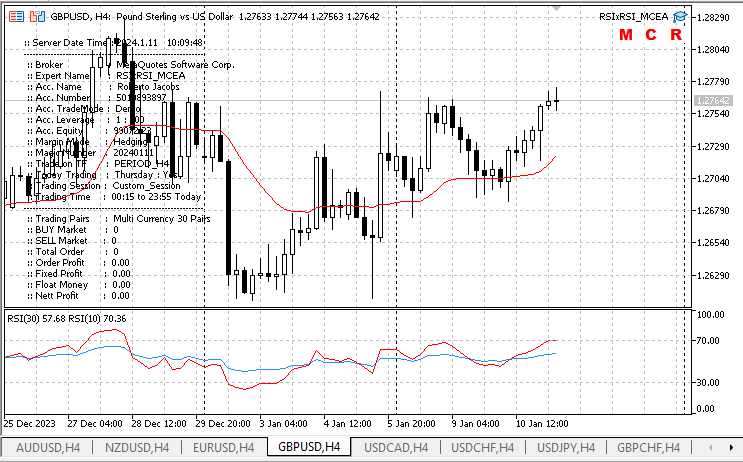
Como podemos ver, bajo el nombre del asesor RSIxRSI_MCasesor, tenemos los botones M, C y R.
Al pulsar el botón M, aparecerá la barra de botones manual, como se muestra en la figura siguiente.

El tráder podrá gestionar las órdenes manualmente cuando se muestre la barra de botones manual:
1. Set SL/TP All Orders ((establecer stop loss/ take profit para todas las órdenes))
Como hemos explicado antes, si Use Order Stop Loss es igual a No y/o Use Order Take Profit es igual a No, pero el tráder tiene la intención de utilizar Stop Loss o Take Profit en todas las órdenes, un solo clic en el botón Set SL/TP All Orders cambiará todas las órdenes y aplicará un Stop Loss y/o Take Profit.
void MCEA::SetSLTPOrders(void) { //--- ResetLastError(); MqlTradeRequest req={}; MqlTradeResult res={}; MqlTradeCheckResult check={}; //-- double modbuysl=0; double modselsl=0; double modbuytp=0; double modseltp=0; string position_symbol; int totalorder=PositionsTotal(); //-- for(int i=totalorder-1; i>=0; i--) { string symbol=PositionGetSymbol(i); position_symbol=symbol; if(mc_position.Magic()==magicEA) { ENUM_POSITION_TYPE opstype = mc_position.PositionType(); if(opstype==POSITION_TYPE_BUY) { Pips(symbol); RefreshTick(symbol); double price = mc_position.PriceCurrent(); double pos_open = mc_position.PriceOpen(); double pos_stop = mc_position.StopLoss(); double pos_take = mc_position.TakeProfit(); modbuysl=SetOrderSL(symbol,opstype,pos_open); if(price<modbuysl) modbuysl=mc_symbol.NormalizePrice(price-slip*pip); modbuytp=SetOrderTP(symbol,opstype,pos_open); if(price>modbuytp) modbuytp=mc_symbol.NormalizePrice(price+slip*pip); //-- if(pos_stop==0.0 || pos_take==0.0) { if(!mc_trade.PositionModify(position_symbol,modbuysl,modbuytp)) { mc_trade.CheckResult(check); Do_Alerts(symbol,"Set SL and TP for "+EnumToString(opstype)+" on "+symbol+" FAILED!!. Return code= "+ (string)mc_trade.ResultRetcode()+". Code description: ["+mc_trade.ResultRetcodeDescription()+"]"); } } } if(opstype==POSITION_TYPE_SELL) { Pips(symbol); RefreshTick(symbol); double price = mc_position.PriceCurrent(); double pos_open = mc_position.PriceOpen(); double pos_stop = mc_position.StopLoss(); double pos_take = mc_position.TakeProfit(); modselsl=SetOrderSL(symbol,opstype,pos_open); if(price>modselsl) modselsl=mc_symbol.NormalizePrice(price+slip*pip); modseltp=SetOrderTP(symbol,opstype,pos_open); if(price<modseltp) modseltp=mc_symbol.NormalizePrice(price-slip*pip); //-- if(pos_stop==0.0 || pos_take==0.0) { if(!mc_trade.PositionModify(position_symbol,modselsl,modseltp)) { mc_trade.CheckResult(check); Do_Alerts(symbol,"Set SL and TP for "+EnumToString(opstype)+" on "+symbol+" FAILED!!. Return code= "+ (string)mc_trade.ResultRetcode()+". Code description: ["+mc_trade.ResultRetcodeDescription()+"]"); } } } } } //-- return; //--- } //-end SetSLTPOrders //---------//
2. Close All Orders (Cerrar todas las órdenes):
Si un tráder desea cerrar todas las órdenes, puede hacerlo con un solo clic en el botón Close All Orders.
void MCEA::CloseAllOrders(void) //-- function: close all order { //---- ResetLastError(); //-- MqlTradeRequest req={}; MqlTradeResult res={}; MqlTradeCheckResult check={}; //-- int total=PositionsTotal(); // number of open positions //--- iterate over all open positions for(int i=total-1; i>=0; i--) { //--- if the MagicNumber matches if(mc_position.Magic()==magicEA) { //-- string position_Symbol = PositionGetSymbol(i); // symbol of the position ulong position_ticket = PositionGetTicket(i); // ticket of the the opposite position ENUM_POSITION_TYPE type = mc_position.PositionType(); RefreshTick(position_Symbol); bool closepos = mc_trade.PositionClose(position_Symbol,slip); //--- output information about the closure PrintFormat("Close #%I64d %s %s",position_ticket,position_Symbol,EnumToString(type)); //--- } } //--- return; //---- } //-end CloseAllOrders() //---------//
3. Close All Profits (cerrar todas las órdenes rentables)
Para cerrar todas las órdenes rentables, bastará con hacer clic en el botón Close All Profits.
bool MCEA::ManualCloseAllProfit(void) { //---- ResetLastError(); //-- bool orclose=false; //-- MqlTradeRequest req={}; MqlTradeResult res={}; MqlTradeCheckResult check={}; //-- int ttlorder=PositionsTotal(); // number of open positions //-- for(int x=0; x<arrsymbx; x++) { string symbol=DIRI[x]; orclose=false; //-- for(int i=ttlorder-1; i>=0; i--) { string position_Symbol = PositionGetSymbol(i); ENUM_POSITION_TYPE type = mc_position.PositionType(); if((position_Symbol==symbol) && (mc_position.Magic()==magicEA)) { double pos_profit = mc_position.Profit(); double pos_swap = mc_position.Swap(); double pos_comm = mc_position.Commission(); double cur_profit = NormalizeDouble(pos_profit+pos_swap+pos_comm,2); ulong position_ticket = PositionGetTicket(i); //--- if(type==POSITION_TYPE_BUY && cur_profit>0.02) { RefreshTick(position_Symbol); orclose = mc_trade.PositionClose(position_Symbol,slip); //--- output information about the closure PrintFormat("Close #%I64d %s %s",position_ticket,position_Symbol,EnumToString(type)); } if(type==POSITION_TYPE_SELL && cur_profit>0.02) { RefreshTick(position_Symbol); orclose = mc_trade.PositionClose(position_Symbol,slip); //--- output information about the closure PrintFormat("Close #%I64d %s %s",position_ticket,position_Symbol,EnumToString(type)); } } } } //-- return(orclose); //---- } //-end ManualCloseAllProfit() //---------//
Al clicar en C, se mostrará un botón de panel con los 30 nombres de los símbolos o pares, y los tráders podrán clicar en uno de los nombres de pares o símbolos.
Clicando en uno de los nombres o símbolos de un par, se sustituirá inmediatamente el símbolo del gráfico por el símbolo cuyo nombre se ha pulsado.
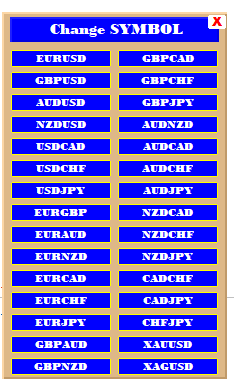
void CreateSymbolPanel() { //--- //-- ResetLastError(); DeletePanelButton(); int sydis=83; int tsatu=int(mc.sall/2); //-- CreateButtonTemplate(0,"Template",180,367,STYLE_SOLID,5,BORDER_RAISED,clrYellow,clrBurlyWood,clrWhite,CORNER_RIGHT_UPPER,187,45,true); CreateButtonTemplate(0,"TempCCS",167,25,STYLE_SOLID,5,BORDER_RAISED,clrYellow,clrBlue,clrWhite,CORNER_RIGHT_UPPER,181,50,true); CreateButtonClick(0,"X",14,14,"Arial Black",10,BORDER_FLAT,"X",clrWhite,clrWhite,clrRed,ANCHOR_CENTER,CORNER_RIGHT_UPPER,22,48,true,"Close Symbol Panel"); //-- string chsym="Change SYMBOL"; int cspos=int(181/2)+int(StringLen(chsym)/2); CreateButtontLable(0,"CCS","Bodoni MT Black",chsym,11,clrWhite,ANCHOR_CENTER,CORNER_RIGHT_UPPER,cspos,62,true,"Change Chart Symbol"); //-- for(int i=0; i<tsatu; i++) CreateButtonClick(0,mc.AS30[i],80,17,"Bodoni MT Black",8,BORDER_RAISED,mc.AS30[i],clrYellow,clrBlue,clrWhite,ANCHOR_CENTER,CORNER_RIGHT_UPPER,180,sydis+(i*22),true,"Change to "+mc.AS30[i]); //-- for(int i=tsatu; i<mc.sall; i++) CreateButtonClick(0,mc.AS30[i],80,17,"Bodoni MT Black",8,BORDER_RAISED,mc.AS30[i],clrYellow,clrBlue,clrWhite,ANCHOR_CENTER,CORNER_RIGHT_UPPER,94,sydis+((i-tsatu)*22),true,"Change to "+mc.AS30[i]); //-- ChartRedraw(0); //-- return; //--- } //-end CreateSymbolPanel() //---------//
En este caso, OnChartEvent() será llamada por ChangeChartSymbol() al pulsar sobre uno de los nombres de símbolo.
if(id==CHARTEVENT_OBJECT_CLICK) { int lensymbol=StringLen(Symbol()); int lensparam=StringLen(sparam); //--- if Symbol button is click if(lensparam==lensymbol) { int sx=mc.ValidatePairs(sparam); ChangeChartSymbol(mc.AS30[sx],CCS); mc.PanelExtra=false; } //-- }
void ChangeChartSymbol(string c_symbol,ENUM_TIMEFRAMES cstf) { //--- //--- unpress the button ObjectSetInteger(0,c_symbol,OBJPROP_STATE,false); ObjectSetInteger(0,c_symbol,OBJPROP_ZORDER,0); ObjectsDeleteAll(0,0,OBJ_BUTTON); ObjectsDeleteAll(0,0,OBJ_LABEL); ObjectsDeleteAll(0,0,OBJ_RECTANGLE_LABEL); //-- ChartSetSymbolPeriod(0,c_symbol,cstf); //-- ChartRedraw(0); //-- return; //--- } //-end ChangeChartSymbol() //---------//
Por último, al pulsar el botón R se eliminará el asesor RSIxRSI_MCasesor Multicurrency del gráfico, por lo que los tráders no tendrán que borrar los asesores manualmente.
if(id==CHARTEVENT_OBJECT_CLICK) { //-- //--- if "R" button is click if(sparam=="R") { Alert("-- "+mc.expname+" -- ",Symbol()," -- Expert Advisor will be Remove from the chart."); ExpertRemove(); //--- unpress the button ObjectSetInteger(0,"R",OBJPROP_STATE,false); ObjectSetInteger(0,"R",OBJPROP_ZORDER,0); if(!ChartSetSymbolPeriod(0,Symbol(),Period())) ChartSetSymbolPeriod(0,Symbol(),Period()); DeletePanelButton(); ChartRedraw(0); } //--- }
Simulador de estrategias
El simulador de estrategias MetaTrader 5 admite y permite probar estrategias, el comercio con símbolos múltiples o probar el comercio automatizado para todos los símbolos disponibles y en todos los marcos temporales disponibles.
En el simulador de estrategias de MetaTrader 5 probaremos el asesor multidivisa RSIxRSI_MCasesor.
En la primera prueba, colocaremos el RSIxRSI_MCEA en el par XAGUSD H4 con un marcos temporales aleatorios de 2023.10.01 a 2024.01.05.
La prueba se ha realizado con dos parámetros de entrada diferentes de los grupos de parámetros Global Strategy EA Parameter (Parámetro asesor de Estrategia Global) y Trade & Order Management (Gestión de Operaciones y órdenes).
1. RSIxRSI_MCEA en el par XAGUSD y el marco temporal H4
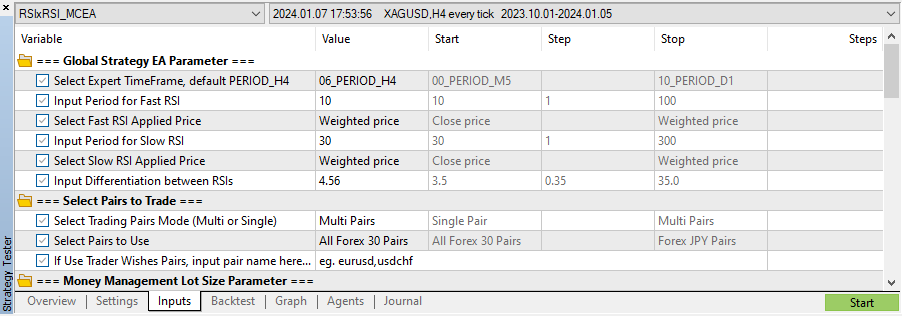
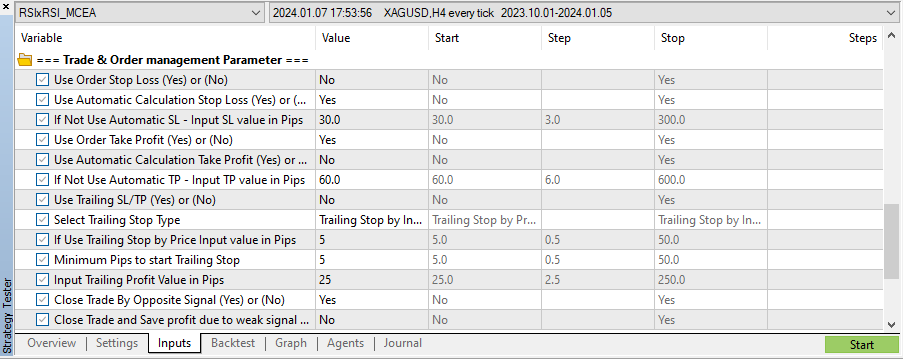
Los resultados de la primera prueba se muestran en la imagen siguiente.
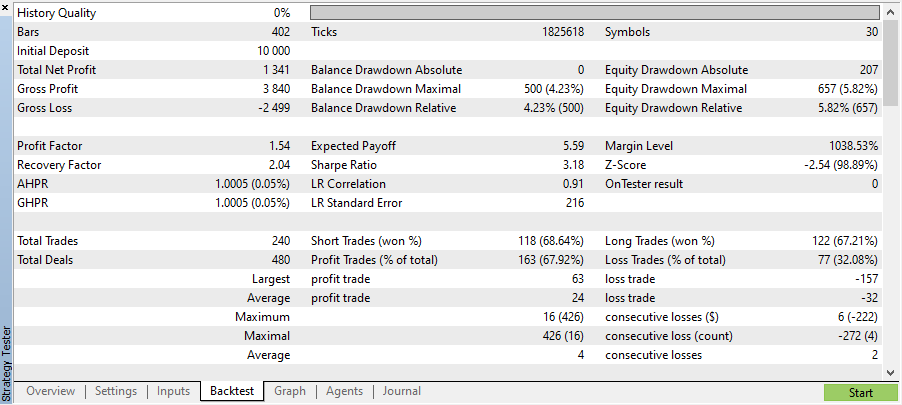
2. RSIxRSI_MCEA en el par XAGUSD y el marco temporal H12.
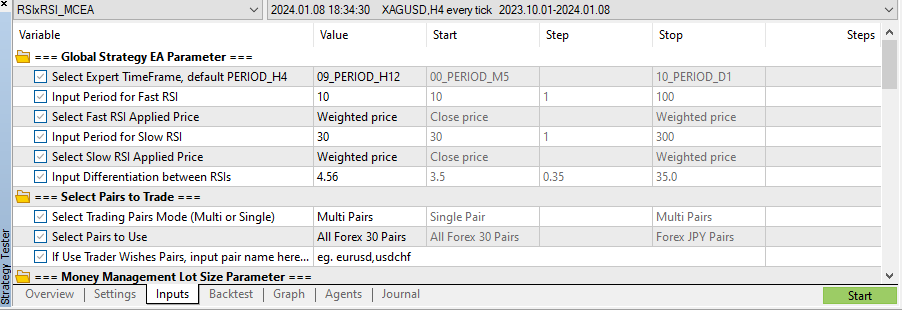
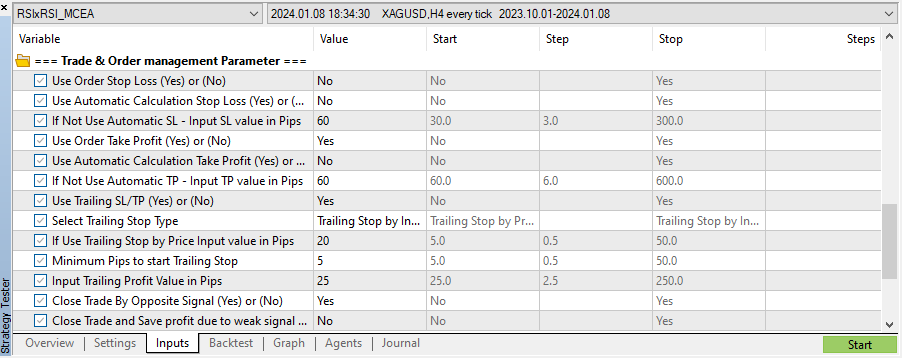
Los resultados de la segunda prueba se muestran en la imagen siguiente.
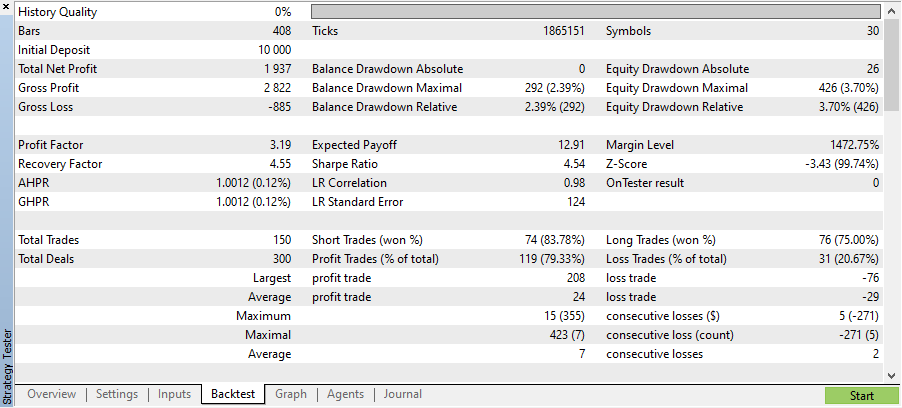
Conclusión
- Crear un asesor multidivisa en MQL5 no resulta muy distinto de desarrollar un asesor monodivisa,
- La creación de un asesor multidivisa aumentará la eficiencia de los tráders, ya que no necesitarán abrir muchos gráficos.
- Una estrategia comercial correcta, combinada con señales de indicadores de alta calidad, aumentará la probabilidad de obtener beneficios en comparación con el uso de un asesor monodivisa. Las pérdidas de un par se compensarán con los beneficios de otros pares.
- El asesor multidivisa RSIxRSI_MCasesor es solo un ejemplo para estudiar y desarrollar nuestras propias ideas. Los resultados de las pruebas en el simulador de estrategias siguen pareciéndonos insatisfactorios. Experimentando y probando en diferentes marcos temporales o calculando diferentes periodos de los indicadores, podremos obtener resultados más rentables.
- La estrategia de cruce de RSI debería explorarse más a fondo experimentando con los marcos temporales, los valores del RSI rápido y lento, y el valor de diferenciación de ambos RSI. Solo hemos obtenido resultados satisfactorios en los marcos temporales H4 y superiores. Por ejemplo, en los marcos temporales H8 y H12 los resultados han sido positivos con un número reducido de transacciones abiertas. En marcos temporales menores, se abren más operaciones que terminan en pérdidas.
Espero que el artículo y el asesor multidivisa resulten útiles a los tráders para estudiar y desarrollar ideas.
¡Gracias por su atención!
Traducción del inglés realizada por MetaQuotes Ltd.
Artículo original: https://www.mql5.com/en/articles/14051
 Desarrollo de un sistema de repetición (Parte 43): Proyecto Chart Trade (II)
Desarrollo de un sistema de repetición (Parte 43): Proyecto Chart Trade (II)
 Desarrollo de un sistema de repetición (Parte 44): Proyecto Chart Trade (III)
Desarrollo de un sistema de repetición (Parte 44): Proyecto Chart Trade (III)
 Algoritmos de optimización de la población: Algoritmo genético binario (Binary Genetic Algorithm, BGA). Parte I
Algoritmos de optimización de la población: Algoritmo genético binario (Binary Genetic Algorithm, BGA). Parte I
- Aplicaciones de trading gratuitas
- 8 000+ señales para copiar
- Noticias económicas para analizar los mercados financieros
Usted acepta la política del sitio web y las condiciones de uso